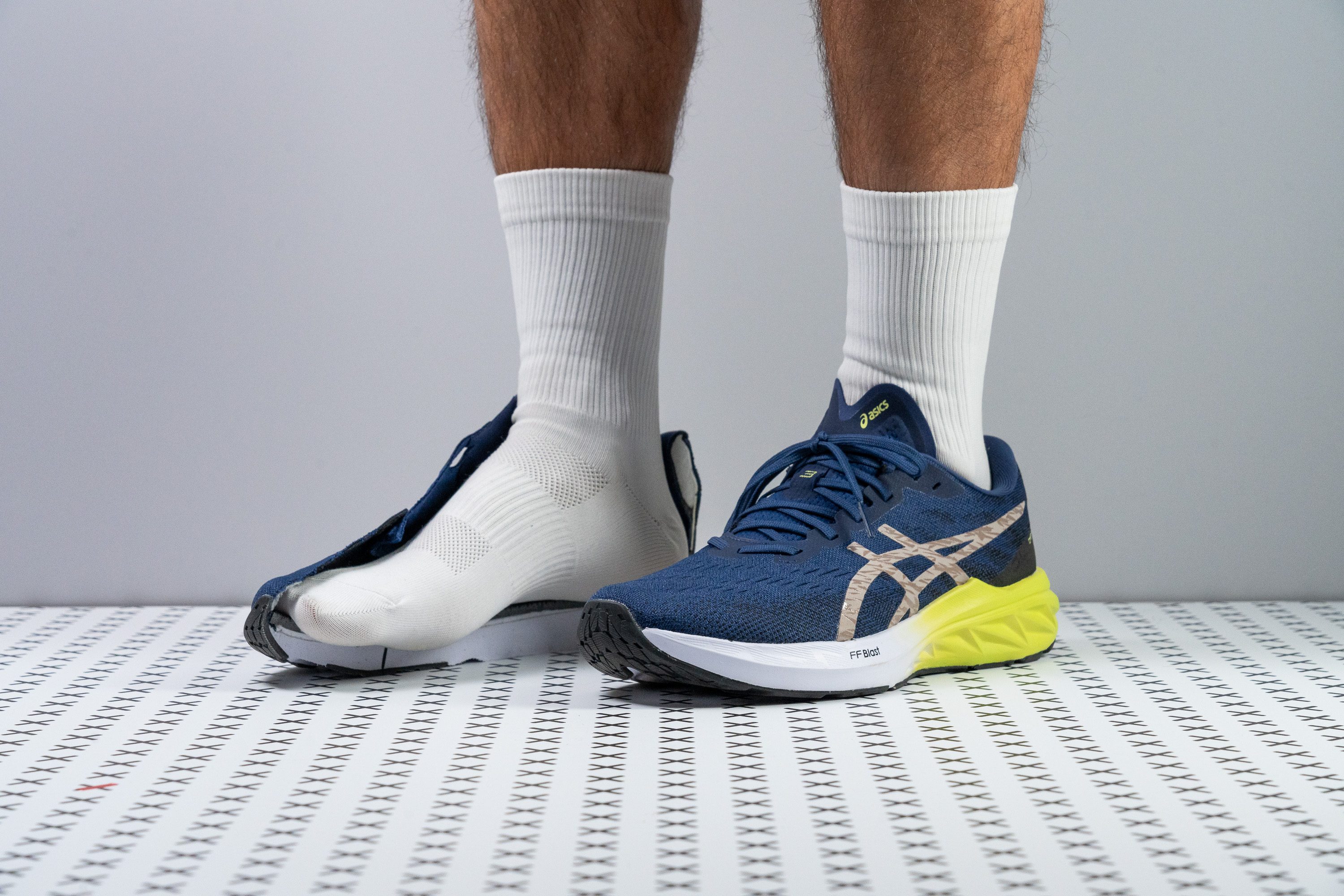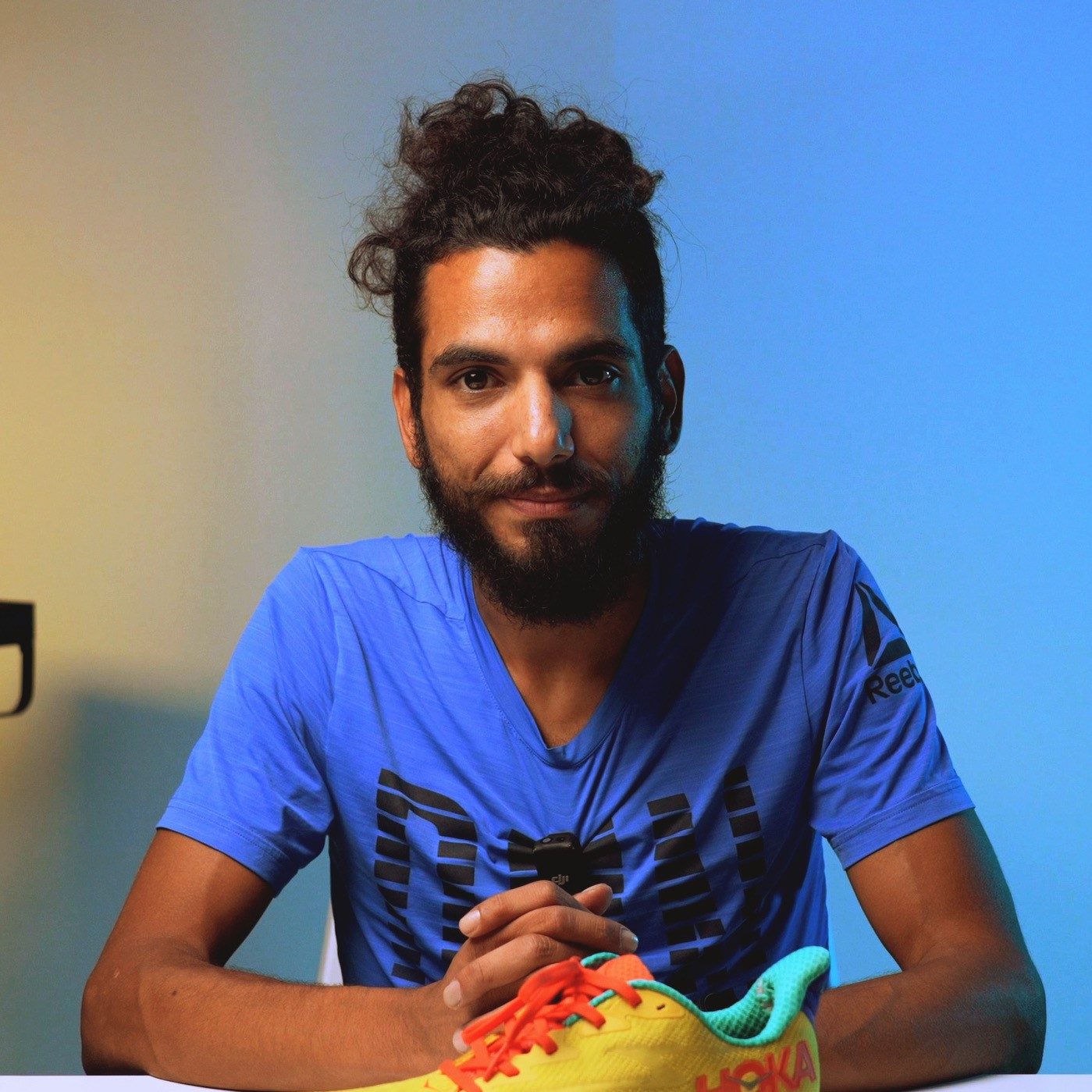Our verdict
- Top pick in best ASICS running shoes (2024)
Pros
- Light and nimble
- Budget-friendly
- Nicely-cushioned landings
- Responsive trampoline-like ride
- Premium feeling comfort
- Strong and grippy outsole
- Performs consistently in the cold
- Durable upper construction
- Roomy toebox
- Good lockdown
- Comfy straight out of the box
Cons
- Lacklustre breathability
- Tongue slips to the side
- Lace bite
Audience verdict
Comparison
The most similar running shoes compared
+ + Add a shoe | |||||
|---|---|---|---|---|---|
| Audience score | 83 Good! | 83 Good! | 84 Good! | 91 Superb! | |
| Price | £115 | £100 | £160 | £115 | |
| Pace | Daily running | Daily running | Daily running | Daily running | |
| Arch support | Neutral | Neutral | Neutral | Neutral | |
| Weight lab Weight brand | 8.7 oz / 248g 9.1 oz / 258g | 8.4 oz / 237g 9.2 oz / 260g | 9.1 oz / 257g 10 oz / 283g | 9.2 oz / 262g 9.3 oz / 264g | |
| Lightweight | ✓ | ✓ | ✗ | ✗ | |
| Drop lab Drop brand | 9.7 mm 8.0 mm | 8.1 mm 8.0 mm | 10.5 mm 10.0 mm | 6.4 mm 8.0 mm | |
| Strike pattern | HeelMid/forefoot | HeelMid/forefoot | Heel | Mid/forefoot | |
| Size | Slightly large | True to size | True to size | True to size | |
| Midsole softness | Balanced | Balanced | Balanced | Balanced | |
| Difference in midsole softness in cold | Small | Small | Normal | Small | |
| Toebox durability | Good | Decent | Decent | Good | |
| Heel padding durability | Decent | Good | Decent | Good | |
| Outsole durability | Good | Good | Good | Good | |
| Breathability | Warm | Moderate | Warm | Warm | |
| Toebox width at the widest part | Medium | Medium | Medium | Narrow | |
| Toebox width at the big toe | Wide | Medium | Medium | Medium | |
| Stiffness | Moderate | Moderate | Moderate | Moderate | |
| Difference in stiffness in cold | Normal | Normal | Small | Small | |
| Torsional rigidity | Moderate | Stiff | Moderate | Moderate | |
| Heel counter stiffness | Stiff | Stiff | Moderate | Stiff | |
| Heel lab Heel brand | 35.7 mm 31.5 mm | 35.3 mm 35.0 mm | 36.9 mm 38.0 mm | 32.6 mm 34.0 mm | |
| Forefoot lab Forefoot brand | 26.0 mm 23.5 mm | 27.2 mm 27.0 mm | 26.4 mm 28.0 mm | 26.2 mm 26.0 mm | |
| Widths available | Normal | Normal | Normal | Normal | |
| Orthotic friendly | ✓ | ✓ | ✓ | ✓ | |
| Season | All seasons | All seasons | All seasons | Winter | |
| Removable insole | ✓ | ✓ | ✓ | ✓ | |
| Ranking | #432 Bottom 20% | #227 Bottom 28% | #216 Bottom 32% | #16 Top 6% | |
| Popularity | #490 Bottom 10% | #100 Top 32% | #72 Top 23% | #234 Bottom 26% |
Who should buy
We recommend the ASICS Dynablast 3 as an excellent choice for:
- Runners with neutral pronation looking for a comfy and durable daily trainer that won't break the bank
- Runners who want a well-cushioned and responsive road shoe that can push the pace and gobble up miles
- Those living in colder climates in need of a shoe that performs consistently during frigid outdoor winter sessions
- Active individuals in the market for a versatile shoe that can take on gym days and a variety of fitness activities
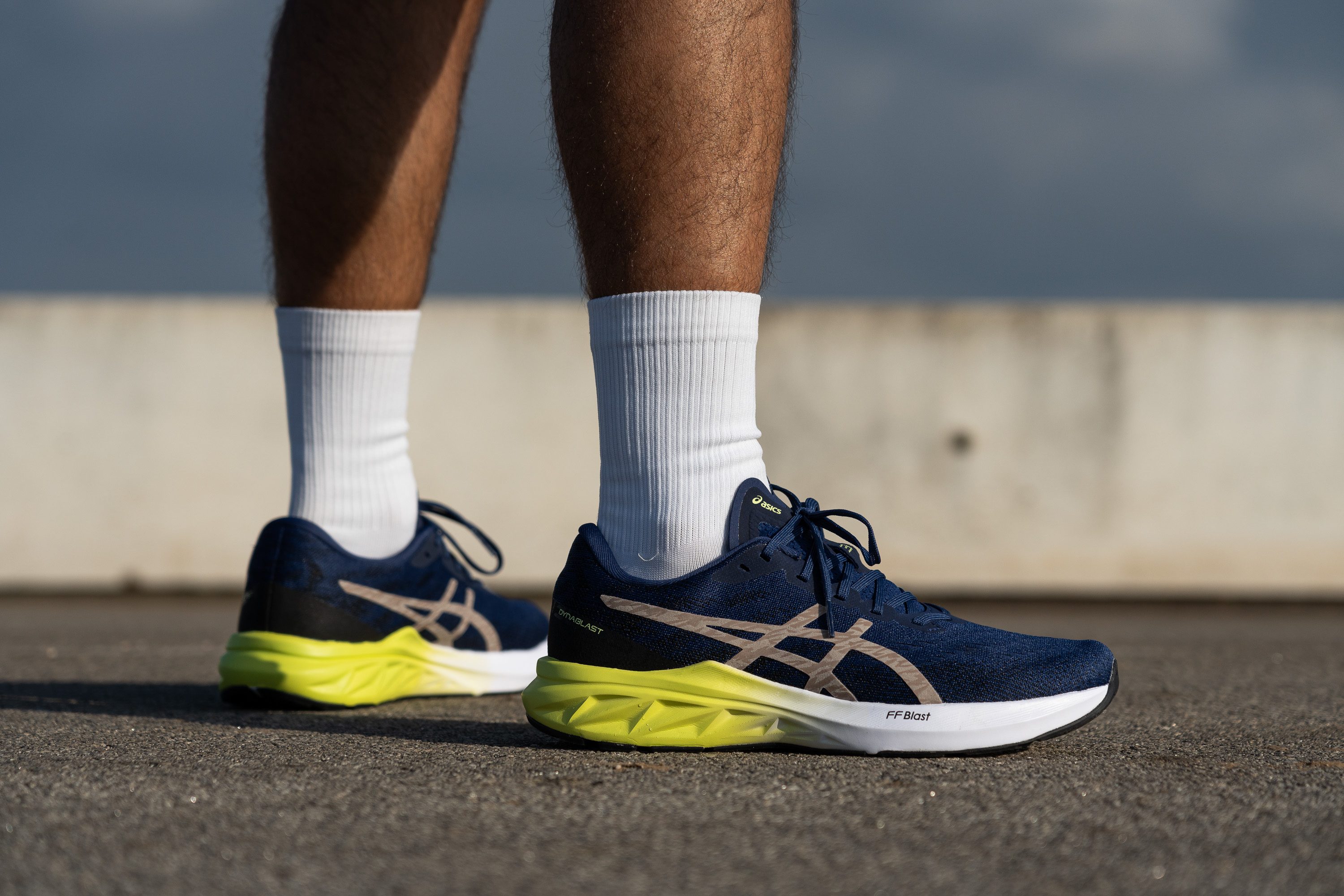
Who should NOT buy
Our smoke test demonstrates a distinct lack of airflow in the Dynablast 3. For runners in warmer climates in need of a more breathable shoe, we recommend checking out the ASICS Jolt 4 or the Brooks Trace 2.
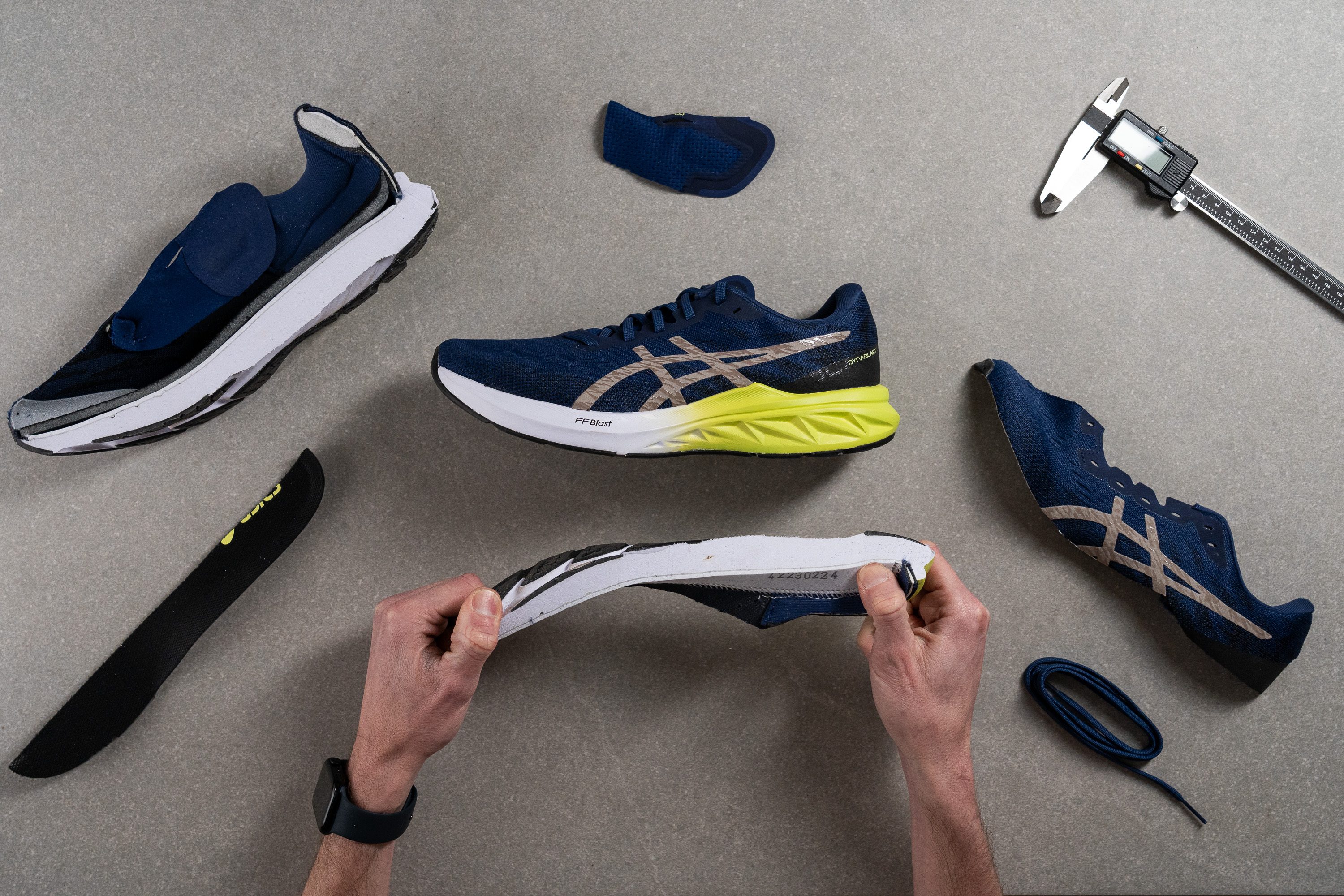
For a daily trainer, the Dynablast 3 has an extremely thin tongue that isn't particularly comfortable across our instep. The Saucony Axon 3 is another well-cushioned daily trainer on a budget that boasts more padding in the tongue according to our measurements.
The Dynablast 3 is a neutral road shoe so we recommend that overpronating runners look into a stability shoe like the ASICS GT 1000 12 as a similarly priced alternative to avoid injury.
Cushioning
Heel stack
The Dynablast 3's lightness is even more impressive when considering how much foam it boasts underfoot. We measured the heel stack with our calliper to be 35.7 mm thick, slightly higher than the advertised 31.5 mm stated by ASICS.
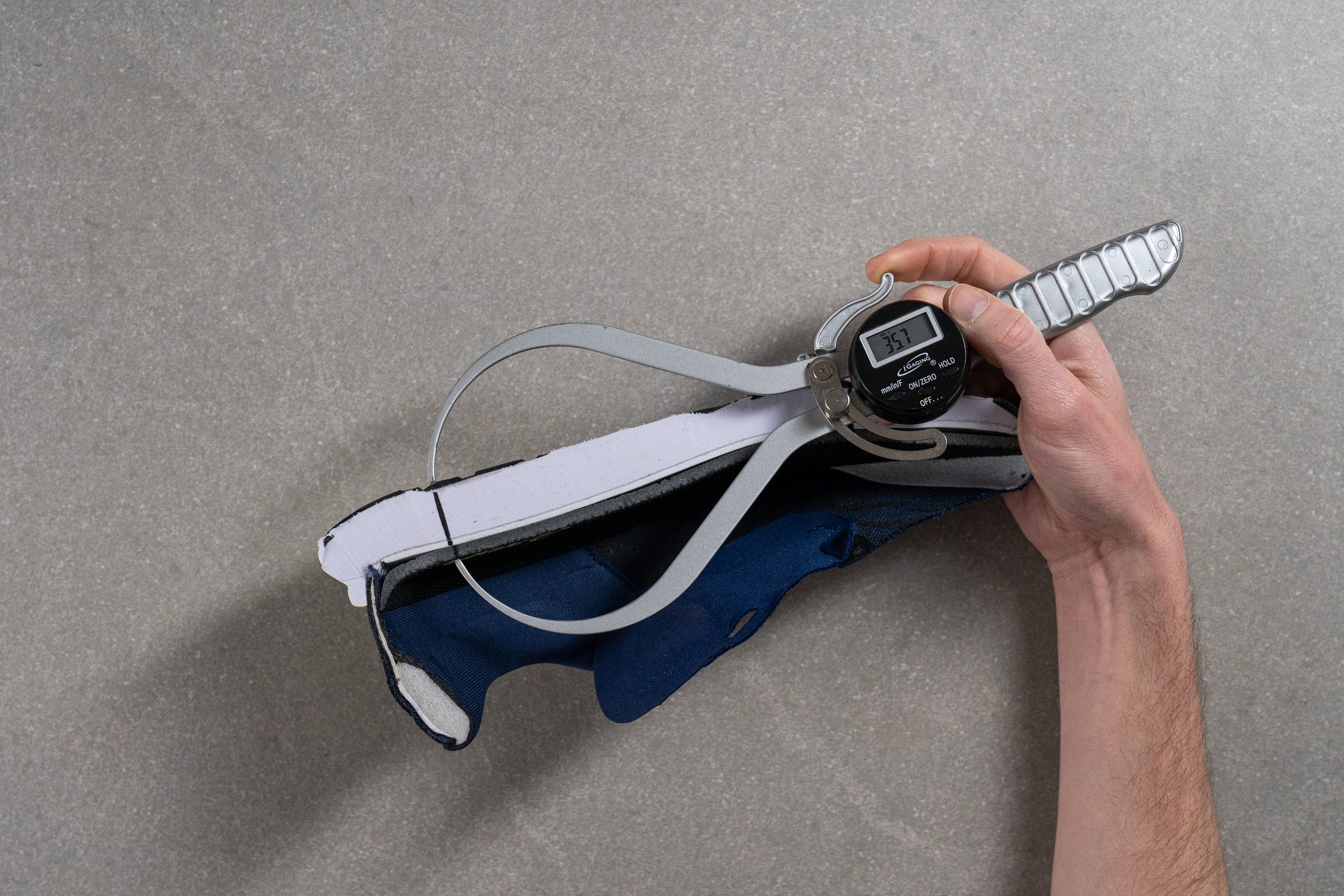
This is an excellent amount of foam underfoot for heel-strikers that ensures well-cushioned and protective landings over any distance.
| Dynablast 3 | 35.7 mm |
| Average | 34.2 mm |
Forefoot stack
The Dynablast 3's stack is just as chunky at the forefoot, measuring 26 mm thick according to our caliper. This is also higher than average and also a few millimeters off the 23.5 mm stated by ASICS. Having such a robust stack means that we were amply protected from impact during our test runs, whether we were smashing the asphalt while pushing the pace or as we tested our stamina on longer runs.
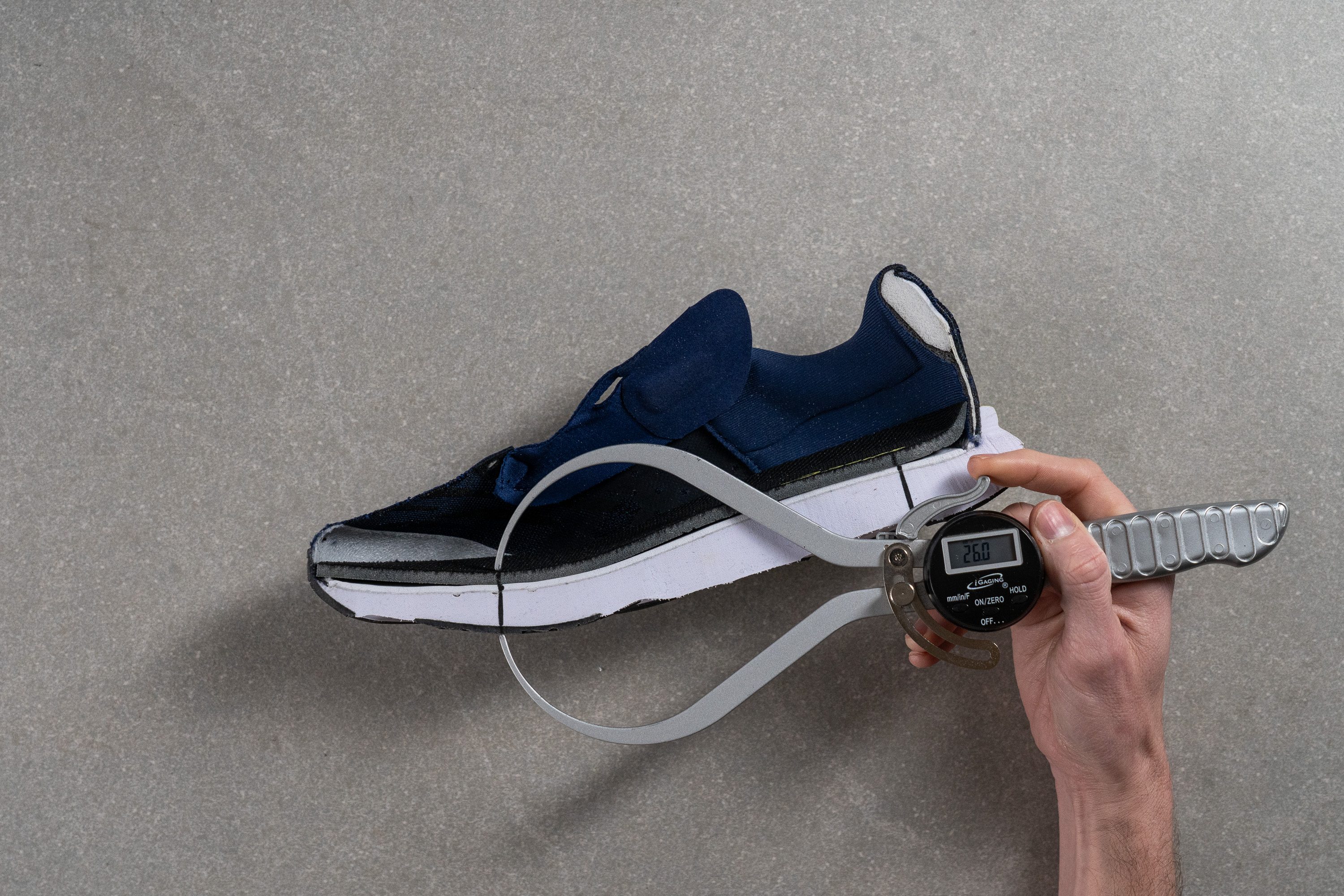
| Dynablast 3 | 26.0 mm |
| Average | 25.7 mm |
Drop
While advertised as having an 8 mm drop, the difference in our stack measurements leaves the Dynablast 3 with an actual drop height of 9.7 mm. This discrepancy isn't too noticeable as it still toes the line between mid and high-drop shoes. As such, the shoe should feel comfortable for most runners regardless of strike pattern.
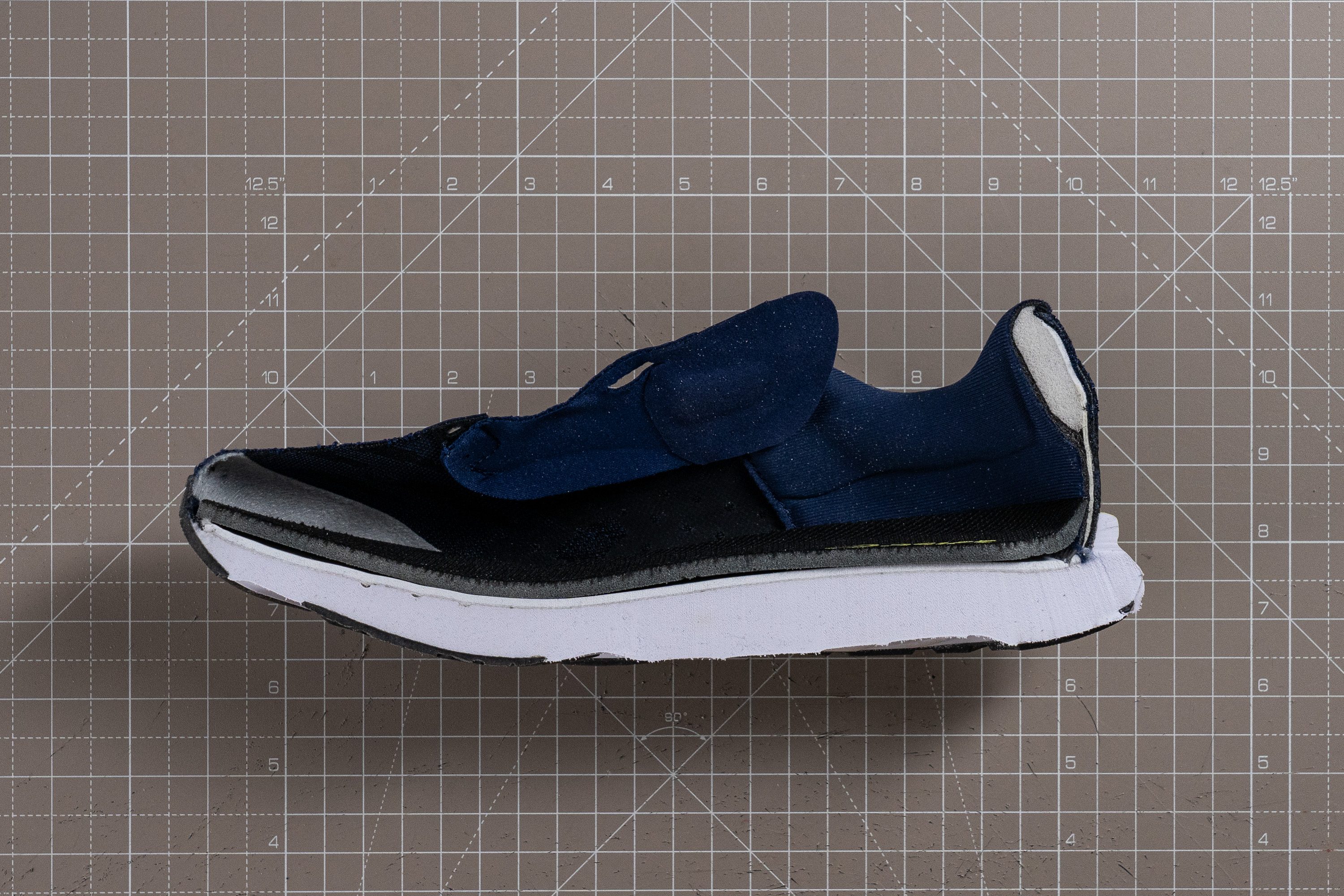
However, we recommend that forefoot striking runners who prefer a shoe with a less drastic offset consider the Saucony Axon 3 with its (confirmed) 5.7 mm heel drop instead.
| Dynablast 3 | 9.7 mm |
| Average | 8.6 mm |
Midsole softness
Pressing our durometer against the Dynablast 3's FF BLAST midsole gives us a reading of 21.8 HA. As such, the shoe feels quite soft underfoot without being too squishy, providing a nice and balanced level of cushioning for our test runs.
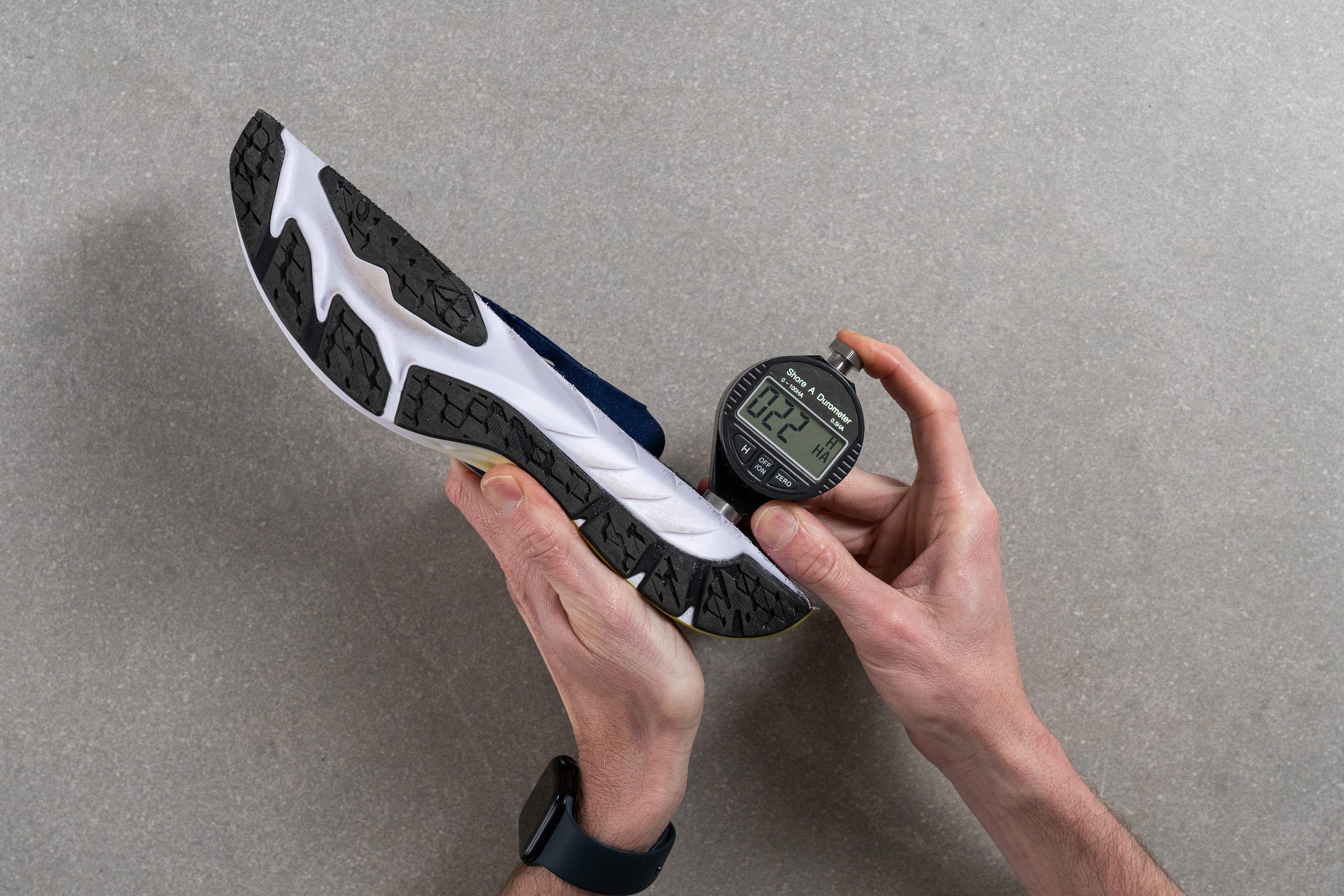
ASICS' FF Blast foam isn't just great for impact protection but has an energetic rebound that feels very responsive underfoot. This plays a big part in this budget shoe's premium feeling ride as we enjoyed great energy return while testing this shoe which makes it great for long-distance running and some speedwork.
Further contributing to the shoe's enjoyable and efficient ride is the midsole's mild yet effective rocker geometry. This feature helps to promote smooth transitions from heel to toe, giving us a sensation of being subtly propelled forward with every stride.
While this doesn't necessarily make us faster but helps us maintain pace more efficiently which is handy when it comes to our speedier or longer sessions.
| Dynablast 3 | 21.8 HA |
| Average | 20.9 HA |
Midsole softness in cold (%)
To observe the effect of cold conditions on the shoe, we placed the Dynablast 3 in our freezer for twenty minutes, after which we pressed our durometer against the midsole once more. The result was so surprising we had to make sure our freezer was still plugged in. We found that the FF Blast only became 5% firmer in the cold, registering a still quite soft reading of 22.9 HA. This is a marginal change which means that the Dynablast 3 should provide soft and comfy landings all year round.
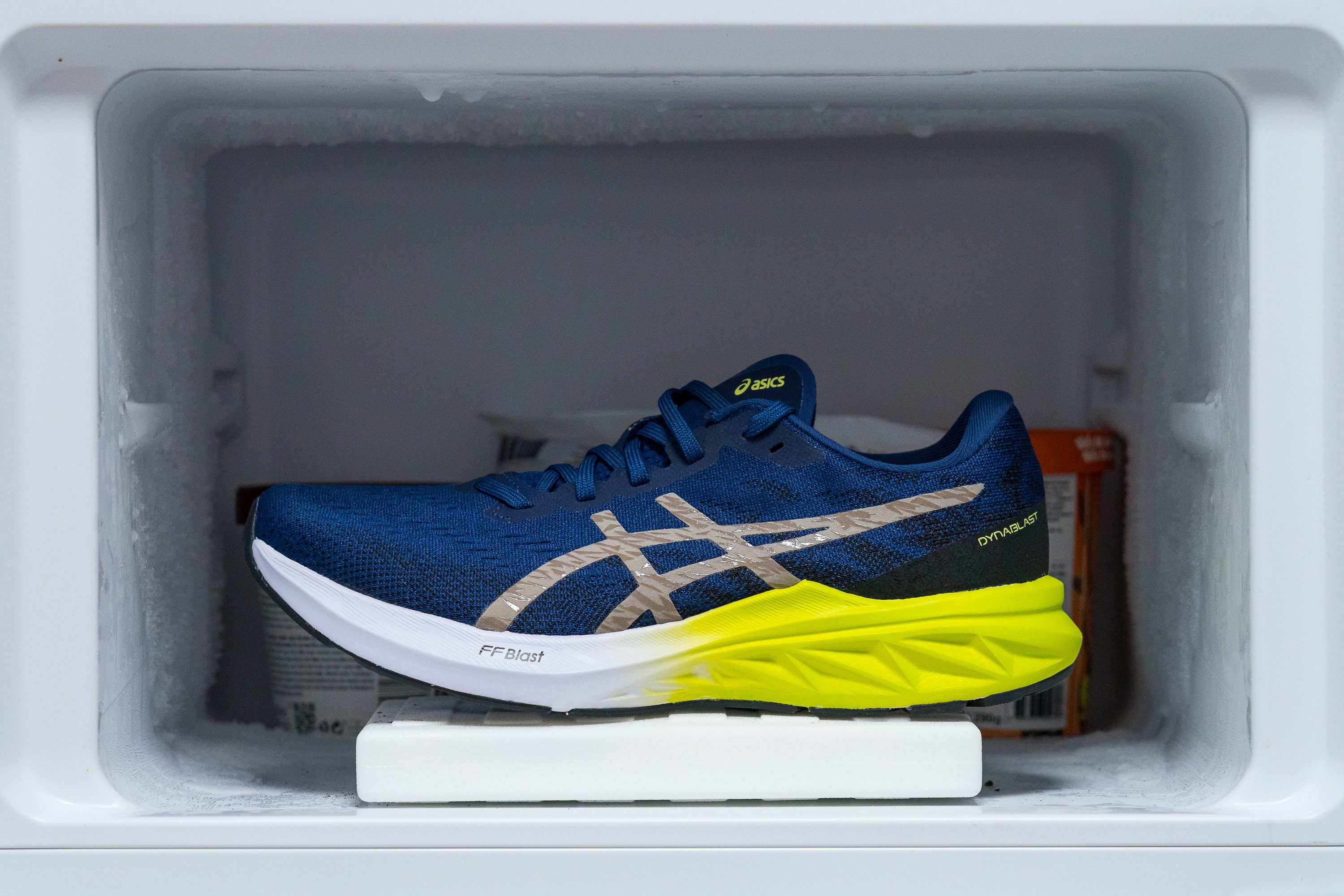
| Dynablast 3 | 5% |
| Average | 25% |
Insole thickness
The Dybablast 3's Ortholite insole is a little thicker than average at 5.5 mm according to our caliper measurements. This gives us a nice and cushy footbed that works nicely in tandem with the midsole to pamper our feet during our test runs while also providing a good amount of arch support.
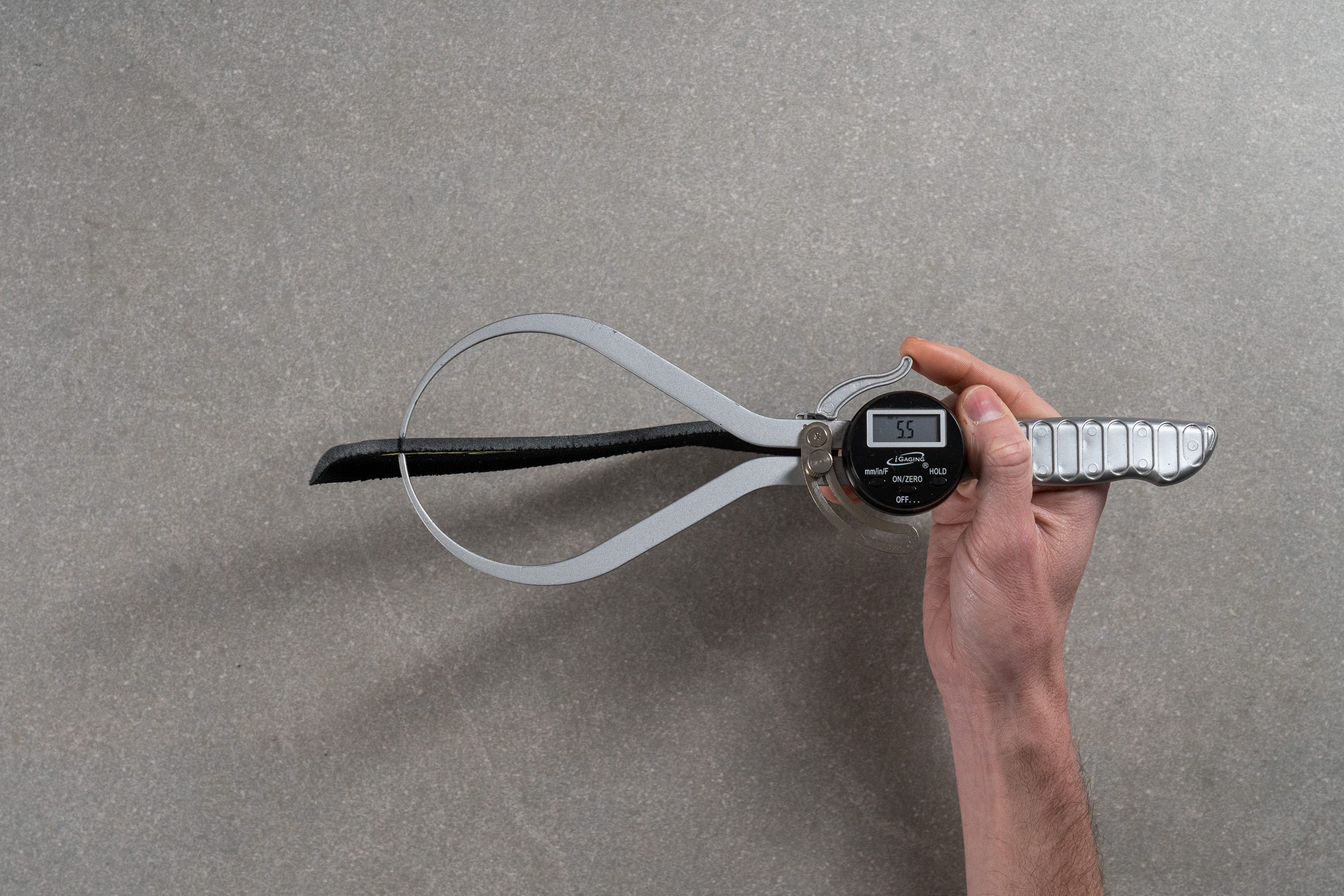
| Dynablast 3 | 5.5 mm |
| Average | 4.5 mm |
Size and fit
Size
ASICS Dynablast 3 is slightly large (15 votes).
Toebox width - widest part
Using our calliper, we measured the Dynablast 3's toebox to be 99.6 mm wide at its widest point. This is roomier than average and means that the shoe should be accommodating enough for most runners, even those with broad feet. This added internal real estate in conjunction with the malleability of the upper mesh means that we didn't feel too constricted. by the toebox, even as our feet swell up towards the latter mile markers of longer runs.
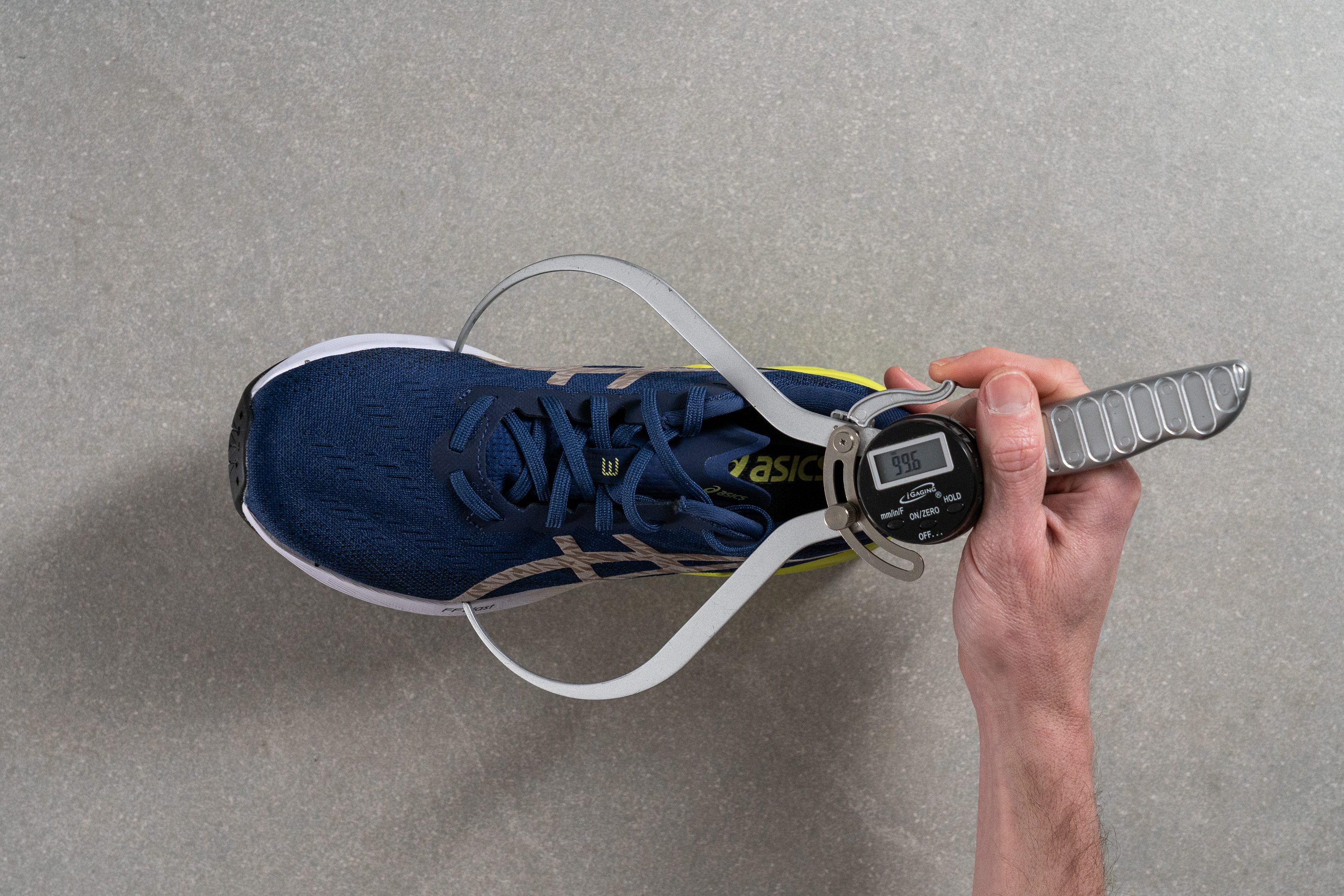
On the other hand, runners with very narrow feet might want to consider sizing down a smidge for a more snug fit as we found that the shoe does run a little long for a US size 9.
This shoe follows methodology 1.7. It has been replaced with methodology 1.8 (the 'gel test') on more recently updated shoes. Results from the two methodologies cannot be directly compared.
| Dynablast 3 | 99.6 mm |
| Average | 98.5 mm |
Toebox width - big toe
At 80.3 mm wide according to our caliper, the Dynablast 3's toebox is wider than average in the area around the big toe. This gives us plenty of room to splay out naturally without butting up against the mesh.
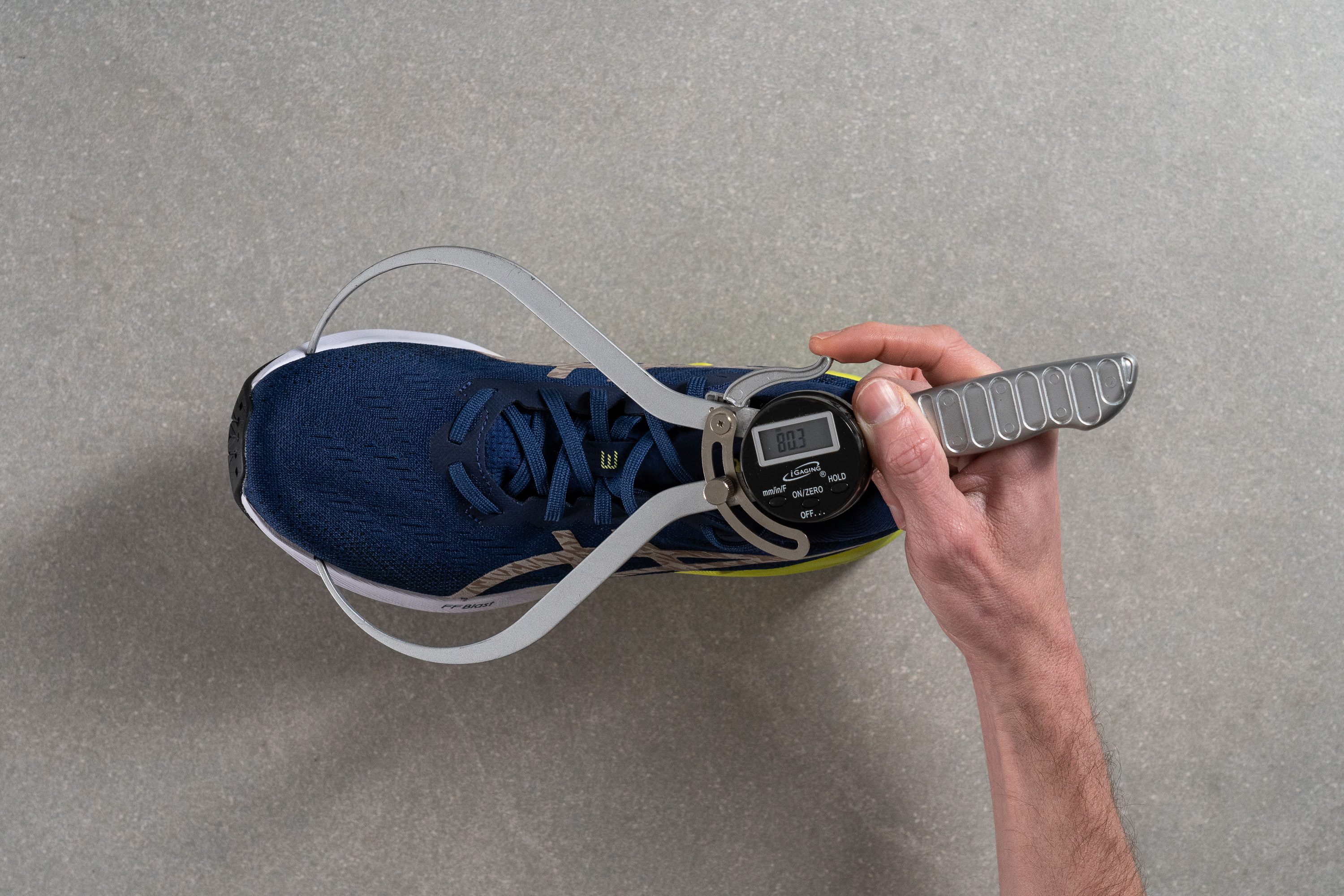
This shoe follows methodology 1.7. It has been replaced with methodology 1.8 (the 'gel test') on more recently updated shoes. Results from the two methodologies cannot be directly compared.
| Dynablast 3 | 80.3 mm |
| Average | 78.4 mm |
Stability
Lateral stability test
The Dynablast 3 feels more stable underfoot than we expected considering it's a neutral trainer sitting on a high stack.
This is certainly thanks in part to the midsole's raised sidewalls that cradle our foot so we don't feel like we're precariously perched atop the foam. While that may be the case, this shoe does little to mitigate excessive lateral movements of our foot. As such, we recommend that those with overpronating strides look into a stability shoe like the ASICS GT 1000 12 or the more expensive Kayano 30 instead.
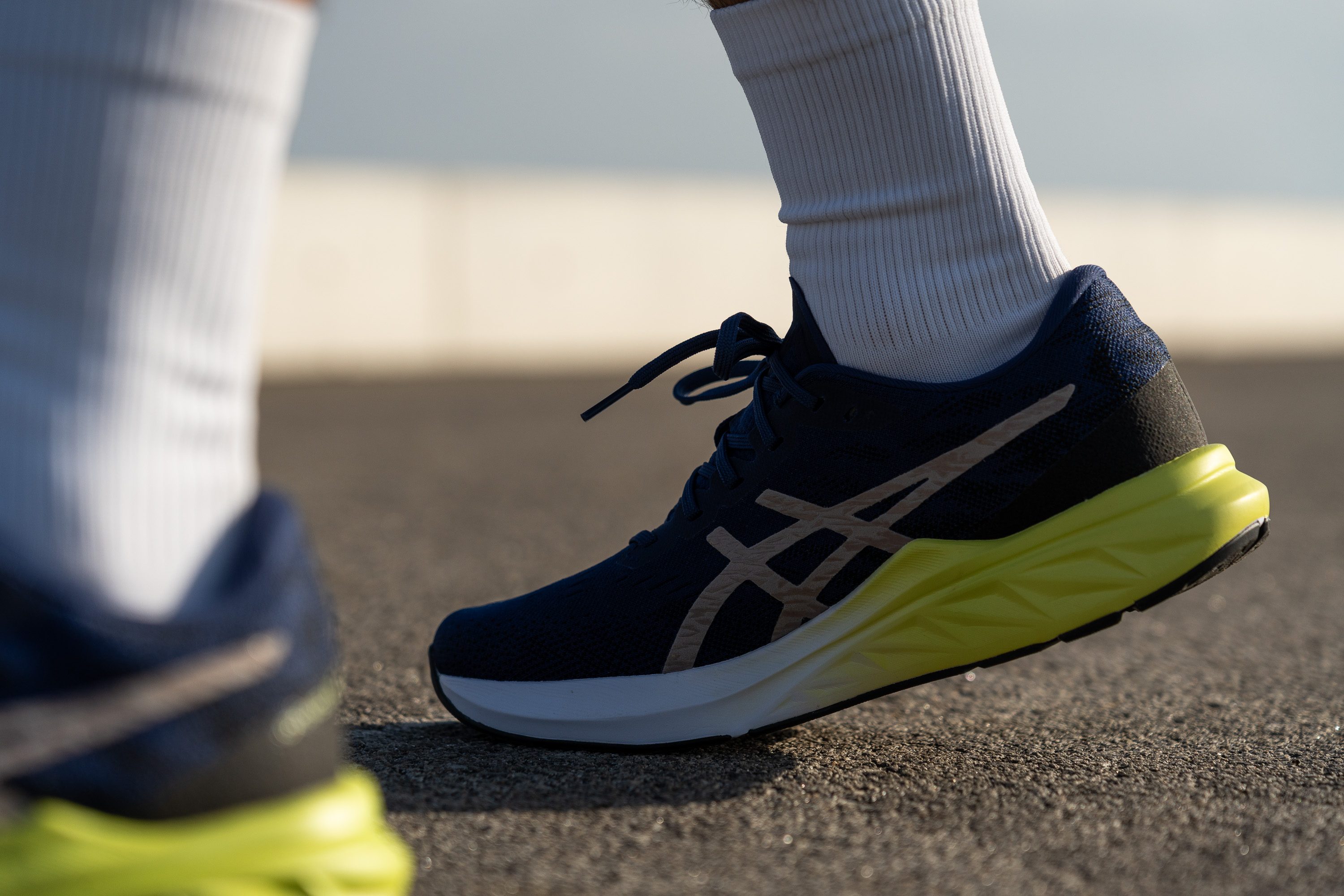
Torsional rigidity
After manually bending and twisting the shoe, we gave the Dynablast 3 a middle-of-the-road torsional rigidity score of 3 out of 5 on our subjective scale. This contributes to its forgiving ride as it doesn't put up much resistance to the natural movements of our foot while still maintaining a reasonably level platform
| Dynablast 3 | 3 |
| Average | 3.4 |
Heel counter stiffness
The heel counter is somewhat stiff, earning a score of 4 out of 5 in our manual assessment.
While the rest of the upper is loose and flexible, the heel collar is generously padded with a large, cloudlike chunk at the rear that gives the shoe some structure. This helps us achieve a secure lockdown that's extremely comfortable and supportive.
| Dynablast 3 | 4 |
| Average | 2.9 |
Midsole width - forefoot
Using our calliper, we measured the midsole to be 112.2 mm wide. This is on par with our current lab average which means that we had enough of a platform for stable landings and toe-offs while testing the Dynablast 3.
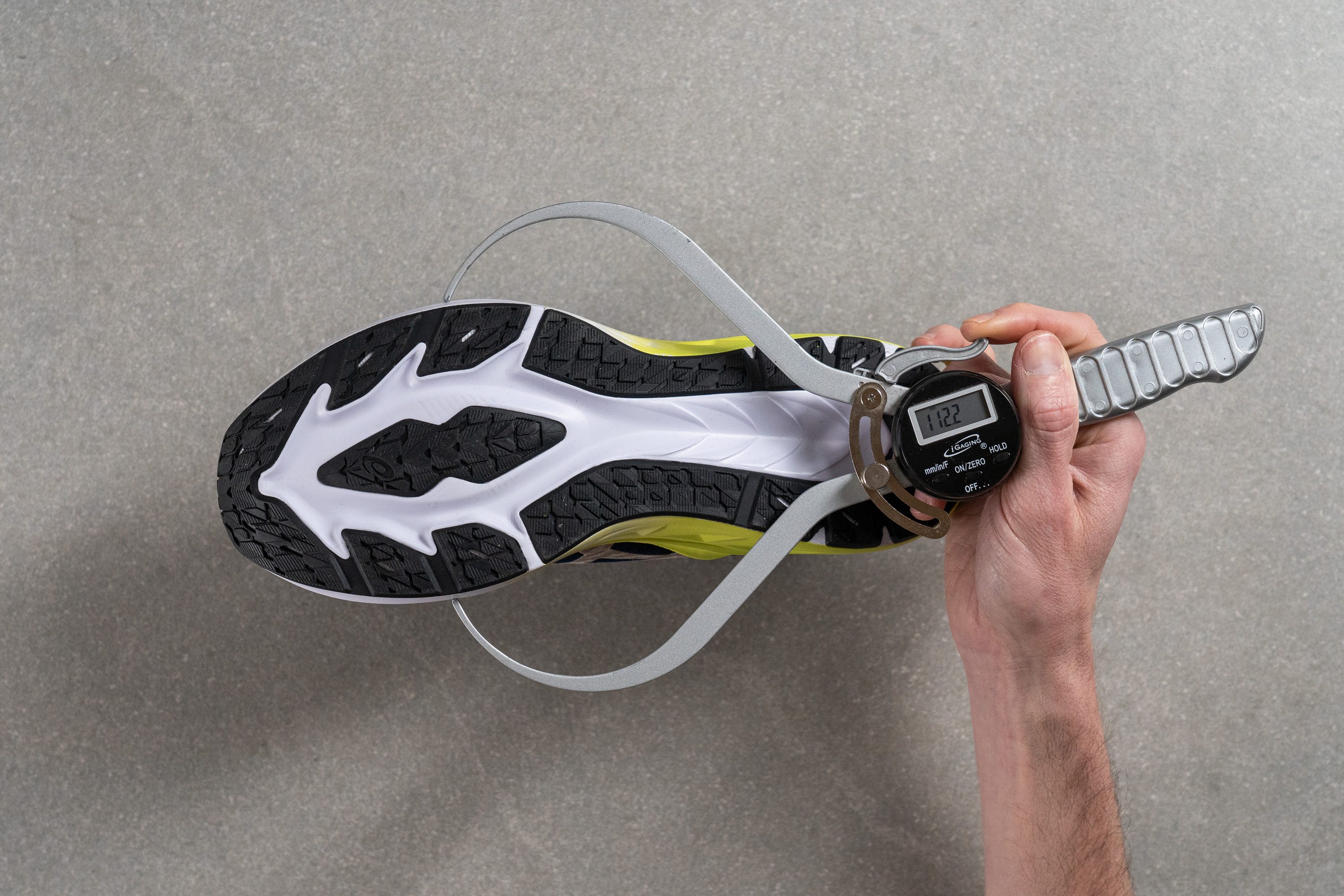
What's more, this contributes to how nimble the Dynablast 3 feels underfoot; allowing us to manoeuvre and take corners smoothly at high speeds during our tempo sessions.
| Dynablast 3 | 112.2 mm |
| Average | 114.2 mm |
Midsole width - heel
Back at the heel, the midsole is narrower than average at only 84.6 mm wide according to our calliper. This tapering toward the rearfoot further adds to the shoe's agile and aerodynamic silhouette. While it shouldn't feel too precarious, we recommend that heel-striking runners who prefer having a wider landing surface check out the ASICS Jolt 4 as an alternative.
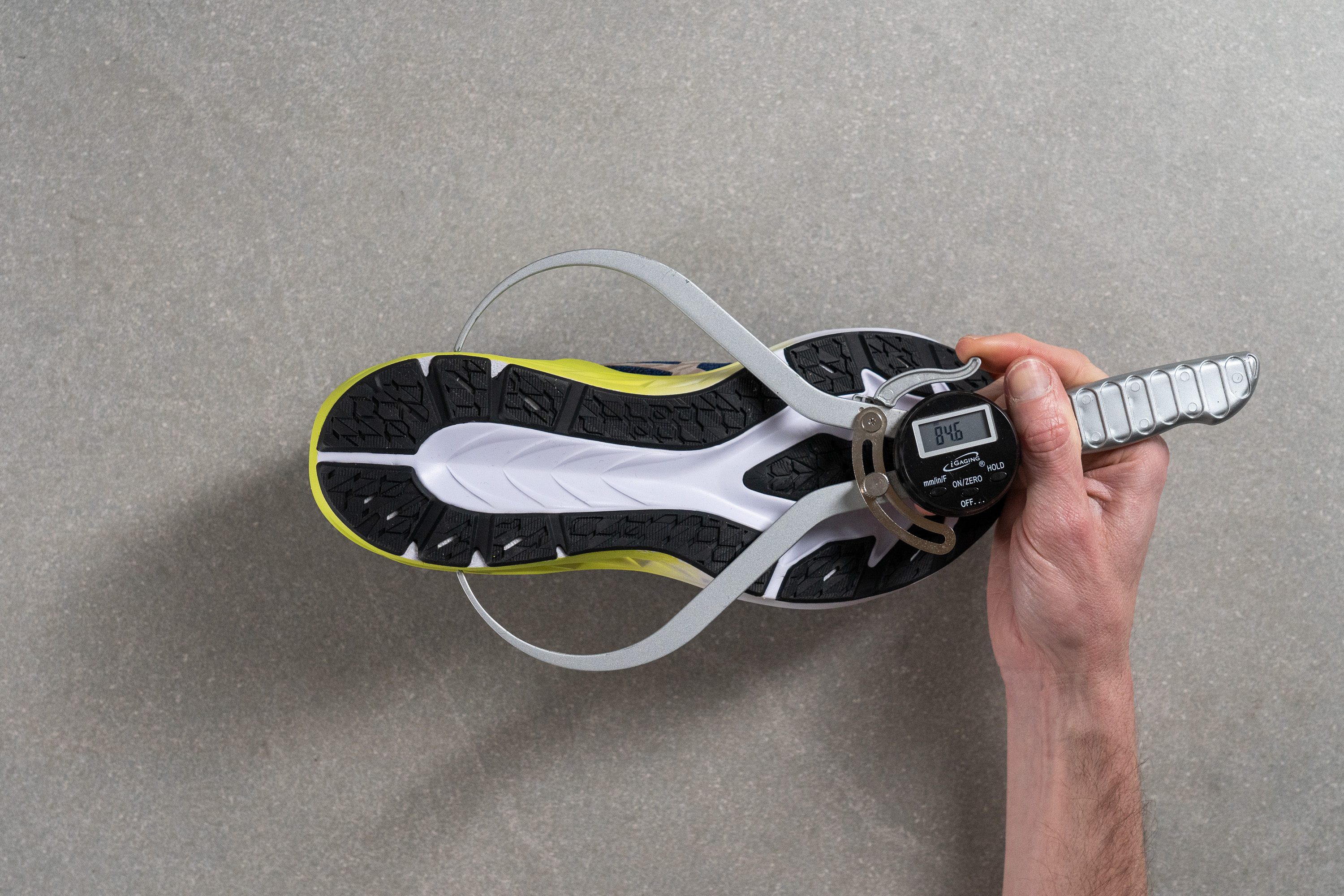
| Dynablast 3 | 84.6 mm |
| Average | 90.7 mm |
Flexibility / Stiffness
We secured the Dynablast 3 to our workbench and used our force gauge to find that only 21.4N of force is required to bend the shoe to 90 degrees. As such, the Dynablast 3 is more flexible than the average road shoe.
This factor greatly contributes to the shoe's forgiving and natural feeling ride as it doesn't put up much resistance the the natural flexion of our foot. What's more, this flexibility is unlocked right out of the box as the shoe didn't need any breaking in as we tested it.
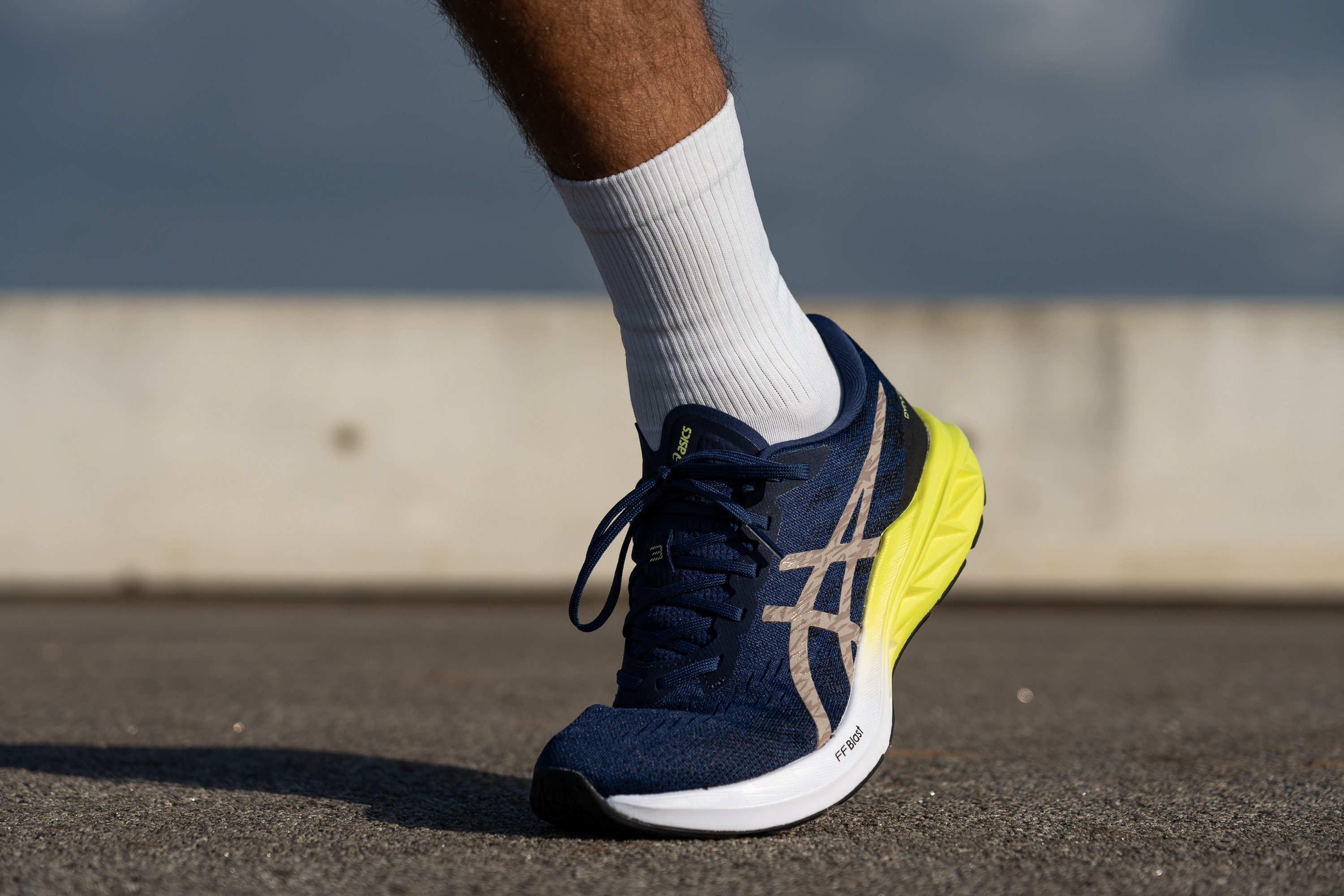
This shoe follows methodology 1.7. It has been replaced with methodology 1.8 (the 'gel test') on more recently updated shoes. Results from the two methodologies cannot be directly compared.
| Dynablast 3 | 21.4N |
| Average | 28.1N |
Stiffness in cold (%)
We also repeated the stiffness test after letting the Dynablast 3 chill in our freezer for twenty minutes and found that it became 25.2% stiffer. This is much more consistent than the average road shoe which stiffens up to a greater extent under similar conditions. As such, the Dynablast 3 should still feel quite flexible and forgiving no matter how frosty conditions get out there.
| Dynablast 3 | 25% |
| Average | 32% |
Weight
Tipping our scale at 8.7 oz (248g) makes the Dynablast 3 lighter than the average road shoe. This lightweight frame is great for a daily trainer as it lends the shoe a level of versatility that allows us to tackle a number of activities in this shoe. Whether we took it out for easy runs, some speedwork, mile-gobbling distance sessions, or even to the gym; we never felt weighed down by this unburdensome workhorse of a shoe.
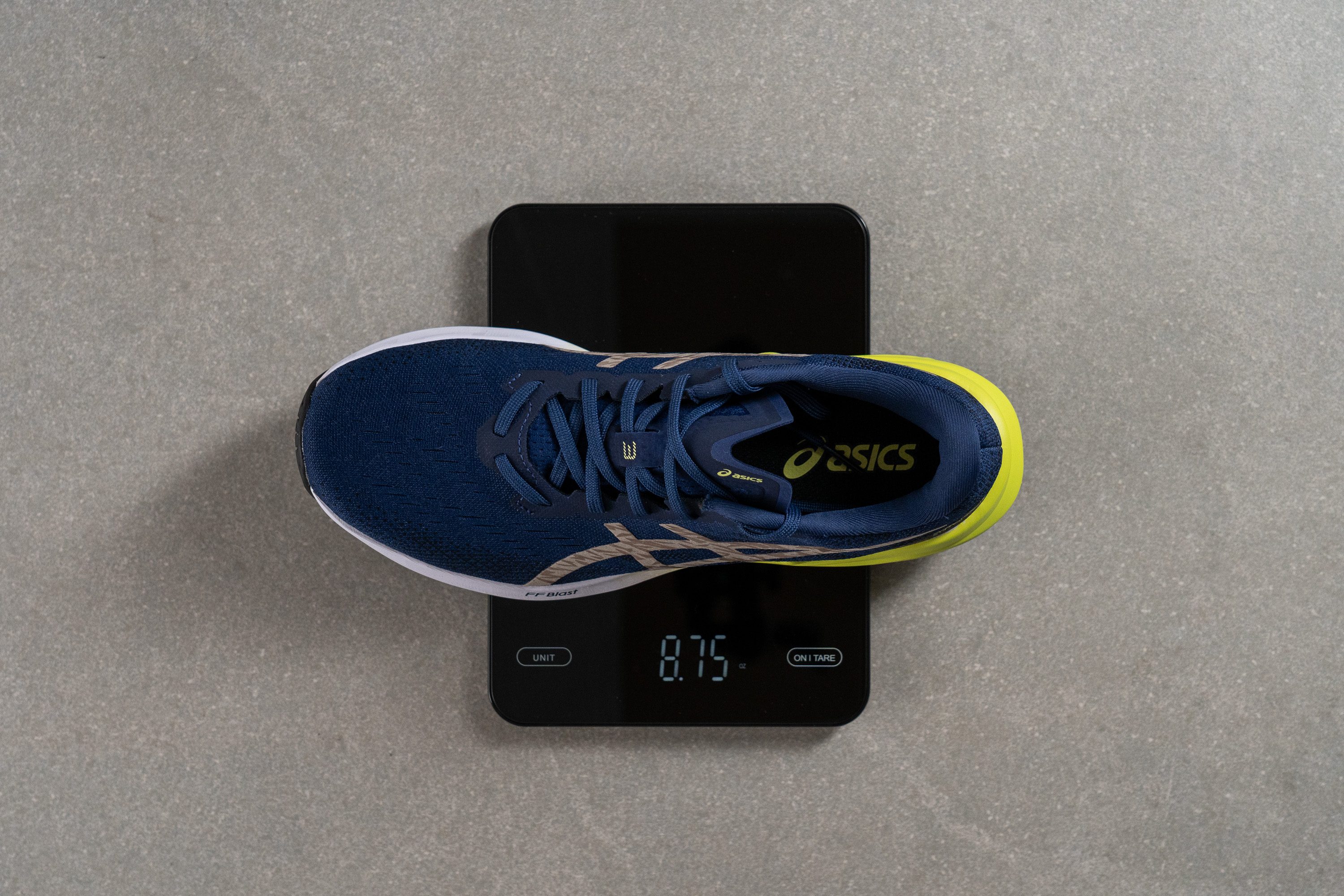
| Dynablast 3 | 8.75 oz (248g) |
| Average | 9.35 oz (265g) |
Breathability
We pumped smoke into the Dynablast 3 to see how well-ventilated it is and, as we can see from the footage, it's only able to filter through the tongue initially. Eventually, a haze slowly emerges through the pores in the rest of the upper. This indicates that heat isn't able to escape the shoe that easily, earning the Dynablast 3 a lacklustre score of 2 out of 5 for breathability. As such, it's not as good an option for outdoor sessions in warm weather as something like the ASICS Jolt 4.
The Saucony Triumph 20, on the other hand, billows through this test, demonstrating a breezy nature better suited for hot summer days.
To shed more light on the matter, we inspected a cross-section of the upper over a backlight. This reveals that the mesh is quite dense as the light is only able to peek through the little pores that dot the upper while the rest of the mesh mostly blocks it out. This goes some ways towards explaining the Dynablast 3's relatively insular nature
This is further confirmed by our closeup shot of the upper mesh which unveils a network of compactly braided fibres woven with very few gaps for airflow. Also, the thin ventilation gaps incorporated into the mesh don't do all the way through, instead revealing another dense layer underneath. This explains the smoke's delayed escape through the shoe's upper.
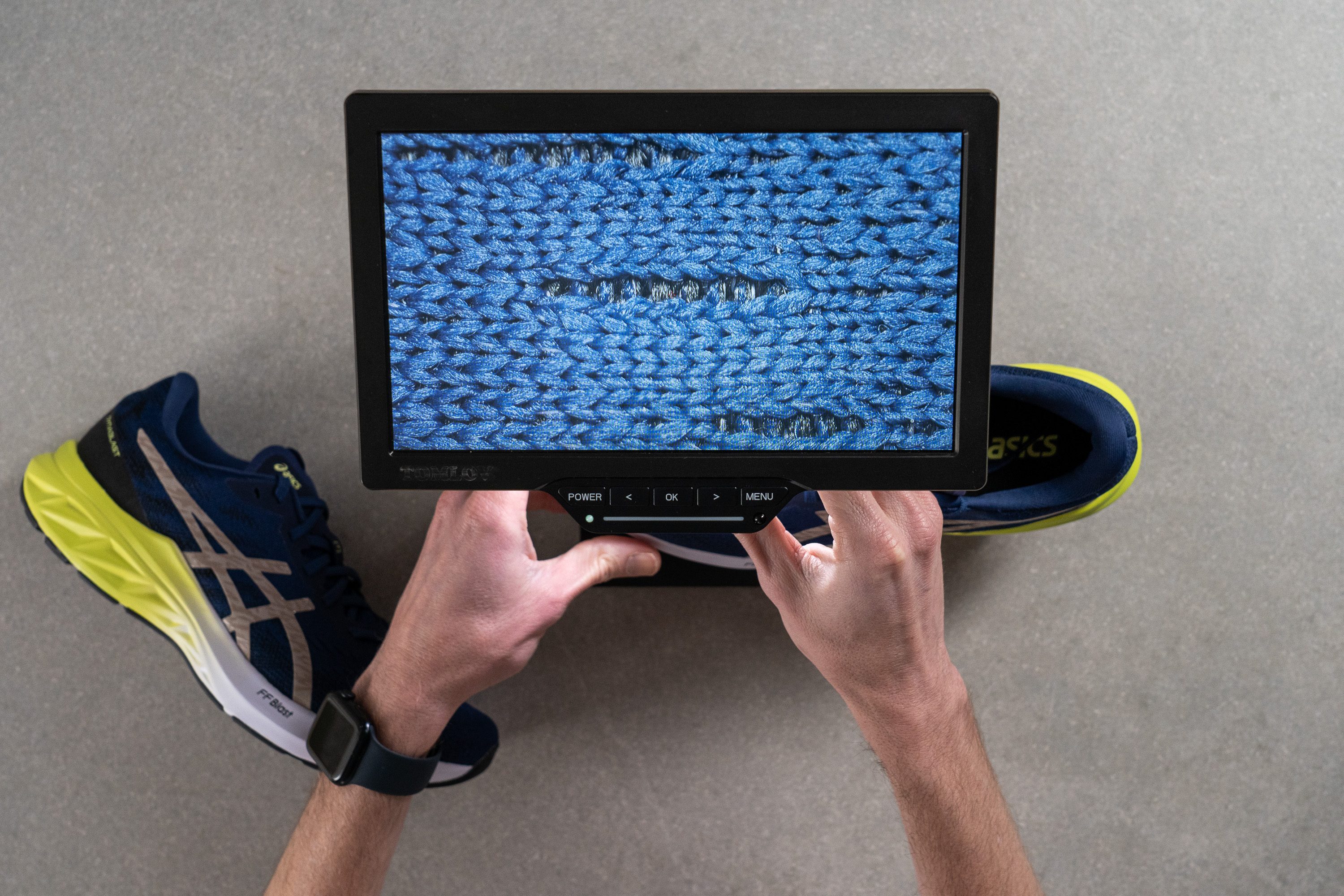
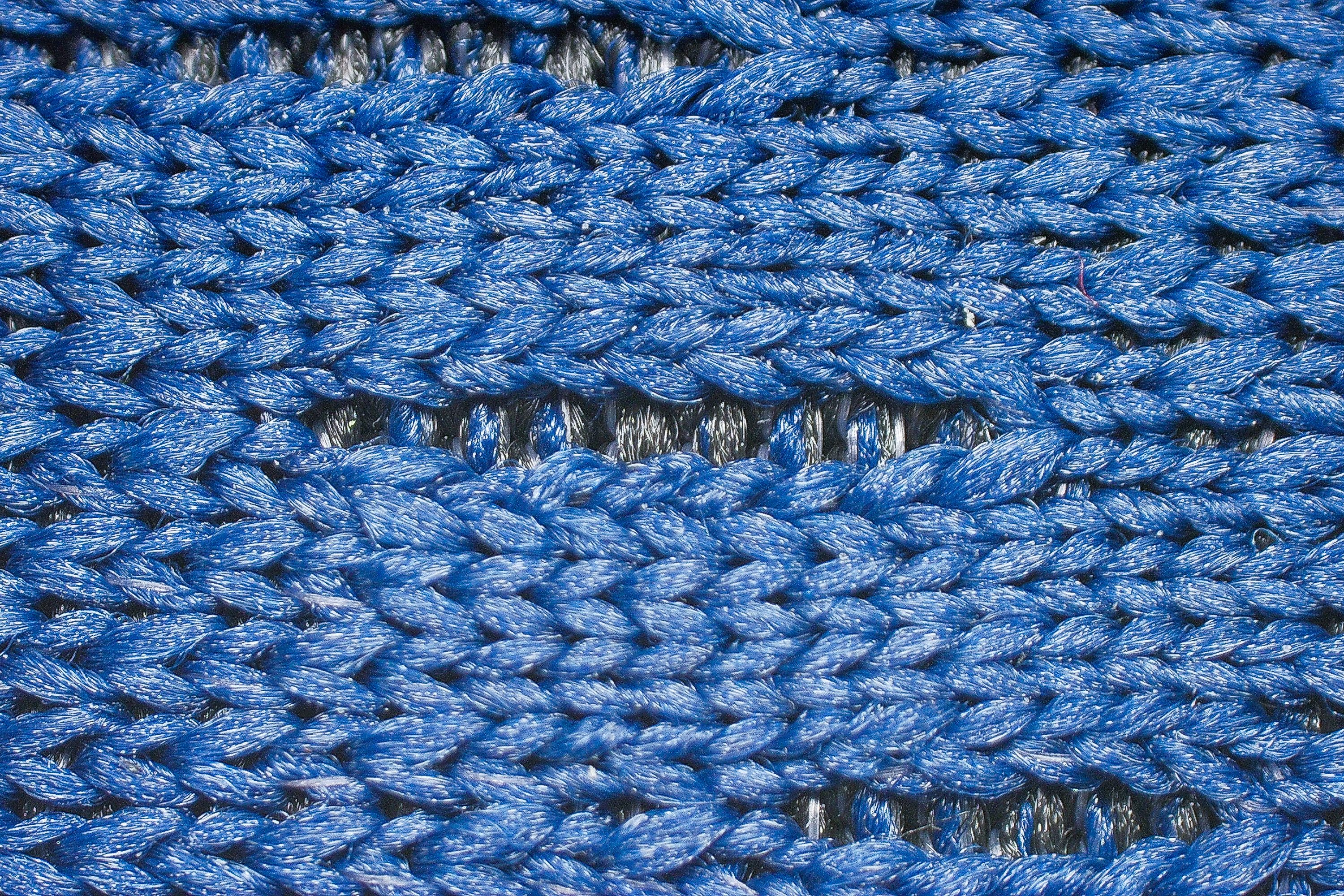
| Dynablast 3 | 2 |
| Average | 3.8 |
Durability
Toebox durability
To test the durability of the Dynablast 3's toebox, we fired up our Dremel to 5K RPM and set it against the mesh with 3.2N of force for a quick four seconds of grinding.
In our experience so far here in the lab, mesh uppers tend not to do very well against our Dremel. However, we were pleasantly surprised by the hardiness displayed by the Dynablast 3's toebox which survived this test with very little damage; earning it a very respectable 4 out of 5.
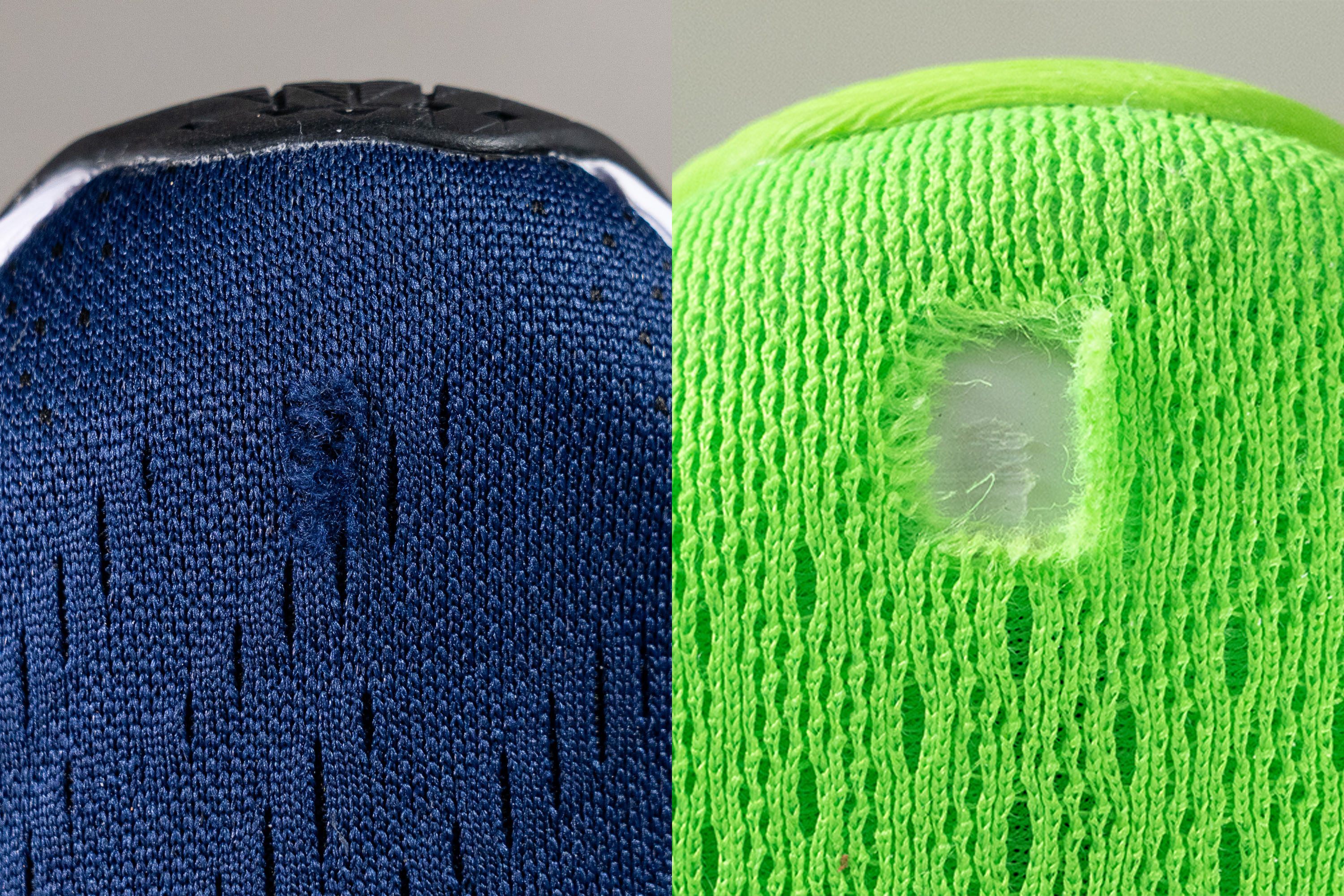
For contrast, look at the gaping hole our tool blasted clean through the Gel Pulse 13's toebox. This is more of what we expected from the similarly priced Dynablast 3.
| Dynablast 3 | 4 |
| Average | 2.6 |
Heel padding durability
The shoe's heel collar also did a fair job of resisting the abrasive force of our Dremel. While the tool's abrasive element was able to mince the lining pretty well, it left the padding within relatively intact.
This earns the Dynablast 3 a run-of-the-mill heel padding durability score which is normal for daily trainers. This gives us no cause for concern regarding wear and tear to the heel collar over the shoe's lifetime, even if frequently used without socks.
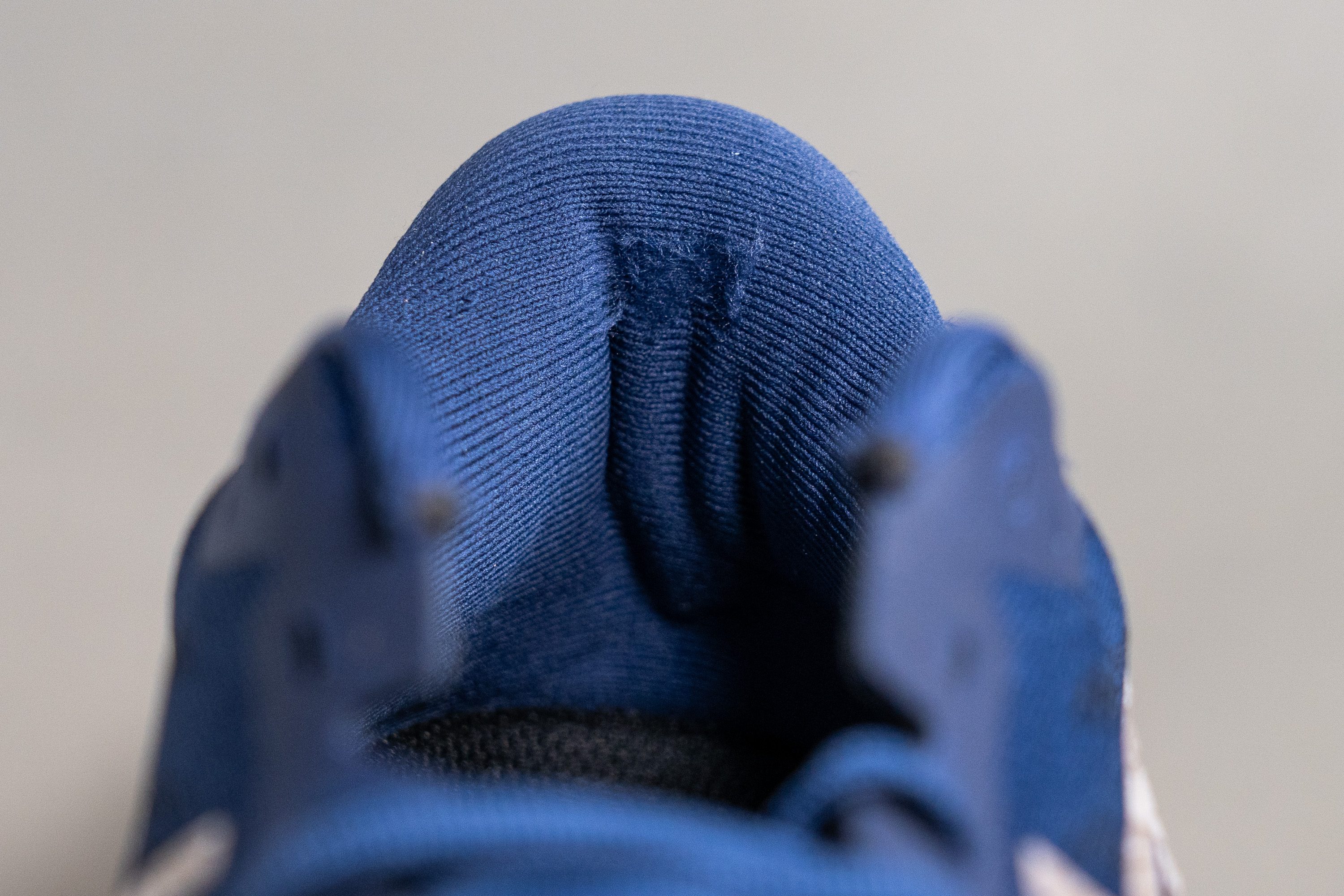
| Dynablast 3 | 3 |
| Average | 3.3 |
Outsole hardness
The Dynablast 3 uses ASICS' AHARPLUS rubber in the outsole which gives us a slightly harder-than-average durometer reading of 85.5 HC. This level of hardness indicates a good level of strength and durability while still being soft enough to bite into surface to provide us with good traction.
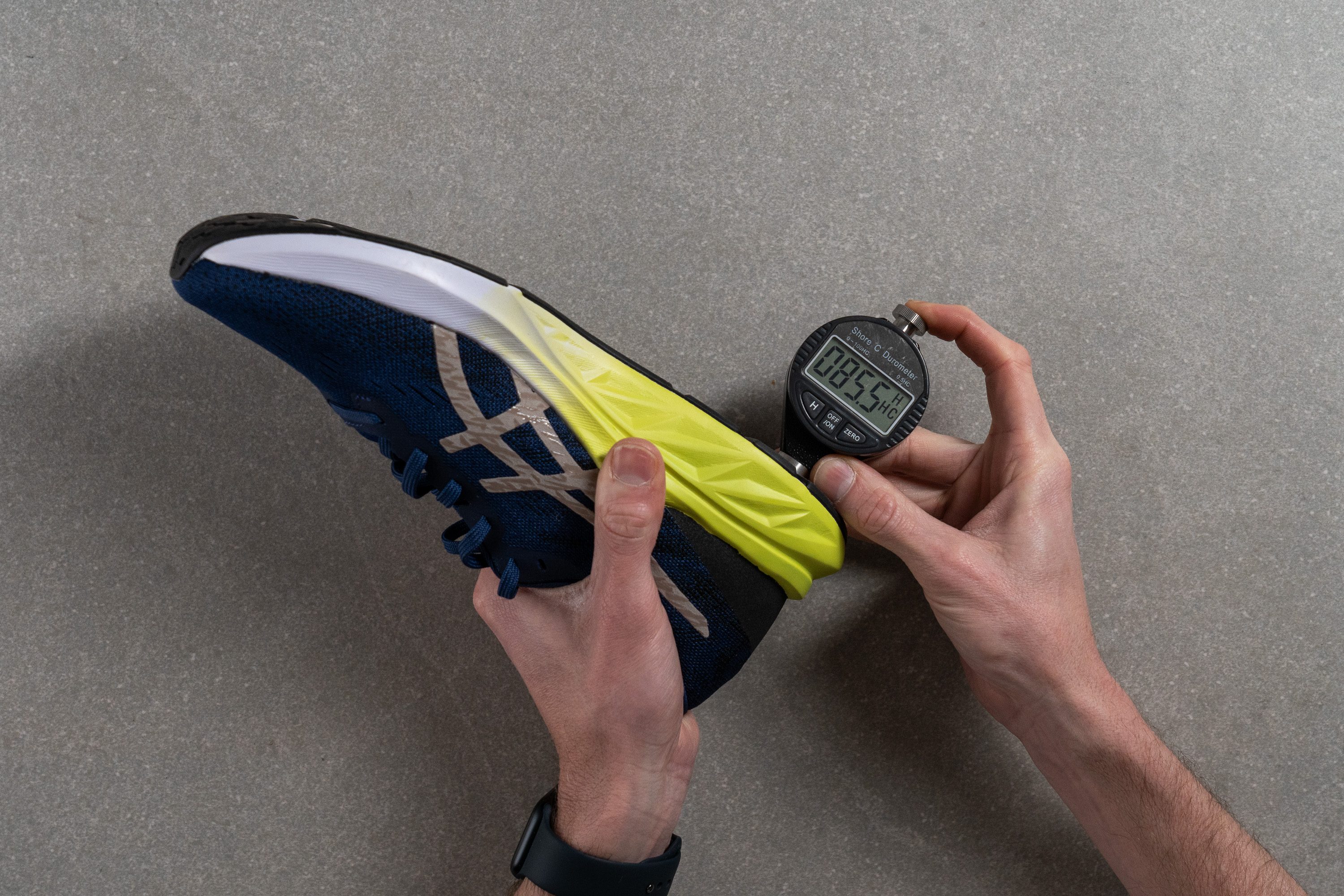
| Dynablast 3 | 85.5 HC |
| Average | 79.5 HC |
Outsole durability
ASICS totes the AHARPLUS rubber as having up to three times the abrasion resistance of regular rubber. To put this claim to the test, we fired up our Dremel to 10K RPM and set it against the outsole for twenty-two seconds.
After powering our tool down, we used a tyre tread gauge to measure the indentation left behind in the aftermath of the test. With only 0.5 mm of rubber worn away, it seems that ASICS' claim holds up this time with the Dynablast 3's outsole being more durable than our current lab average. As such, we expect this shoe to have a shelf life of at least 400 to 500 miles before the outsole starts degrading noticeably.
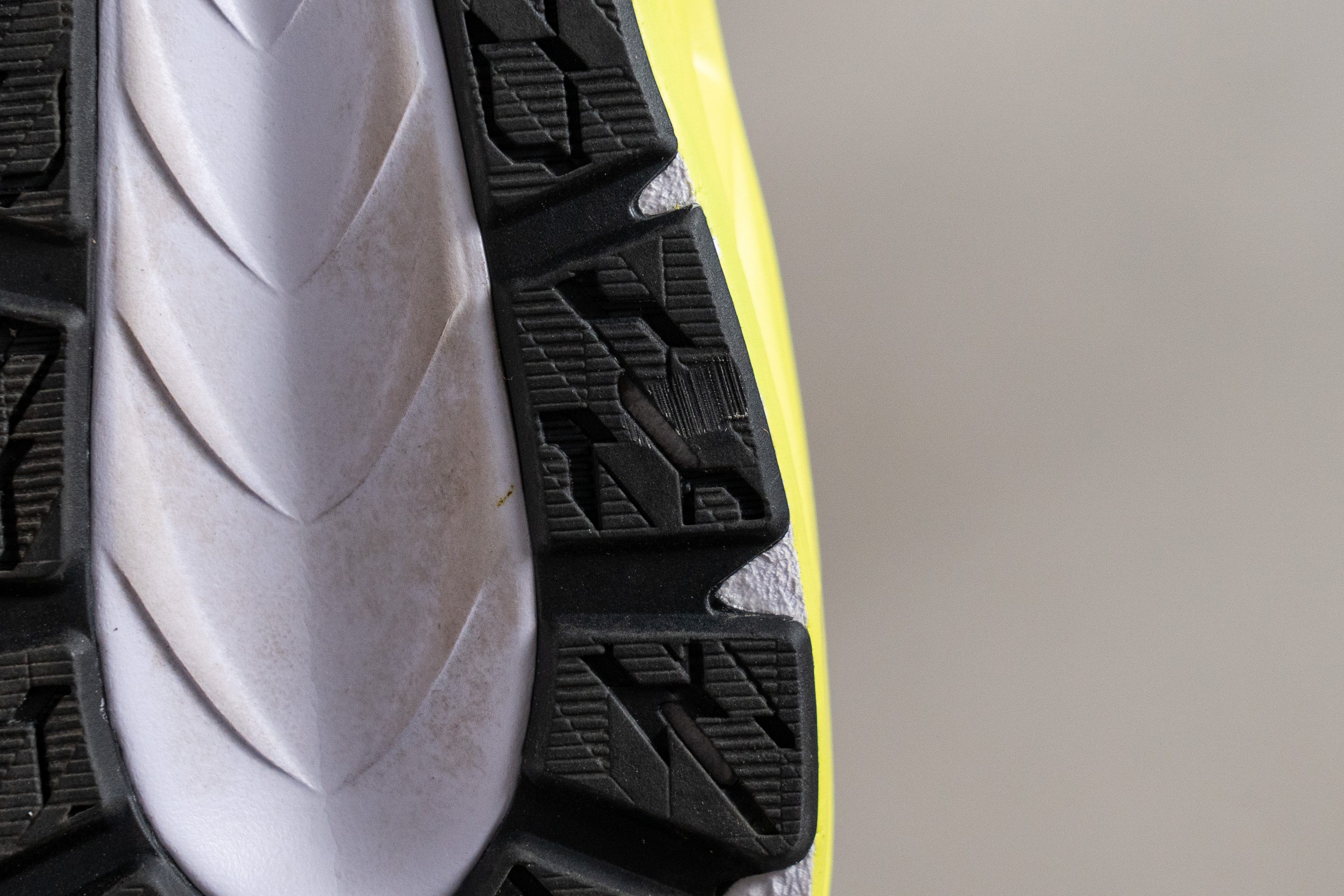
| Dynablast 3 | 0.5 mm |
| Average | 1.1 mm |
Outsole thickness
Using our calliper, we measured the Dynablast 3's outsole to be 3.2 mm thick which is right on par with our current lab average. This is a good amount of rubber underfoot considering how well the shoe performed in our previous test of extreme wear and tear.
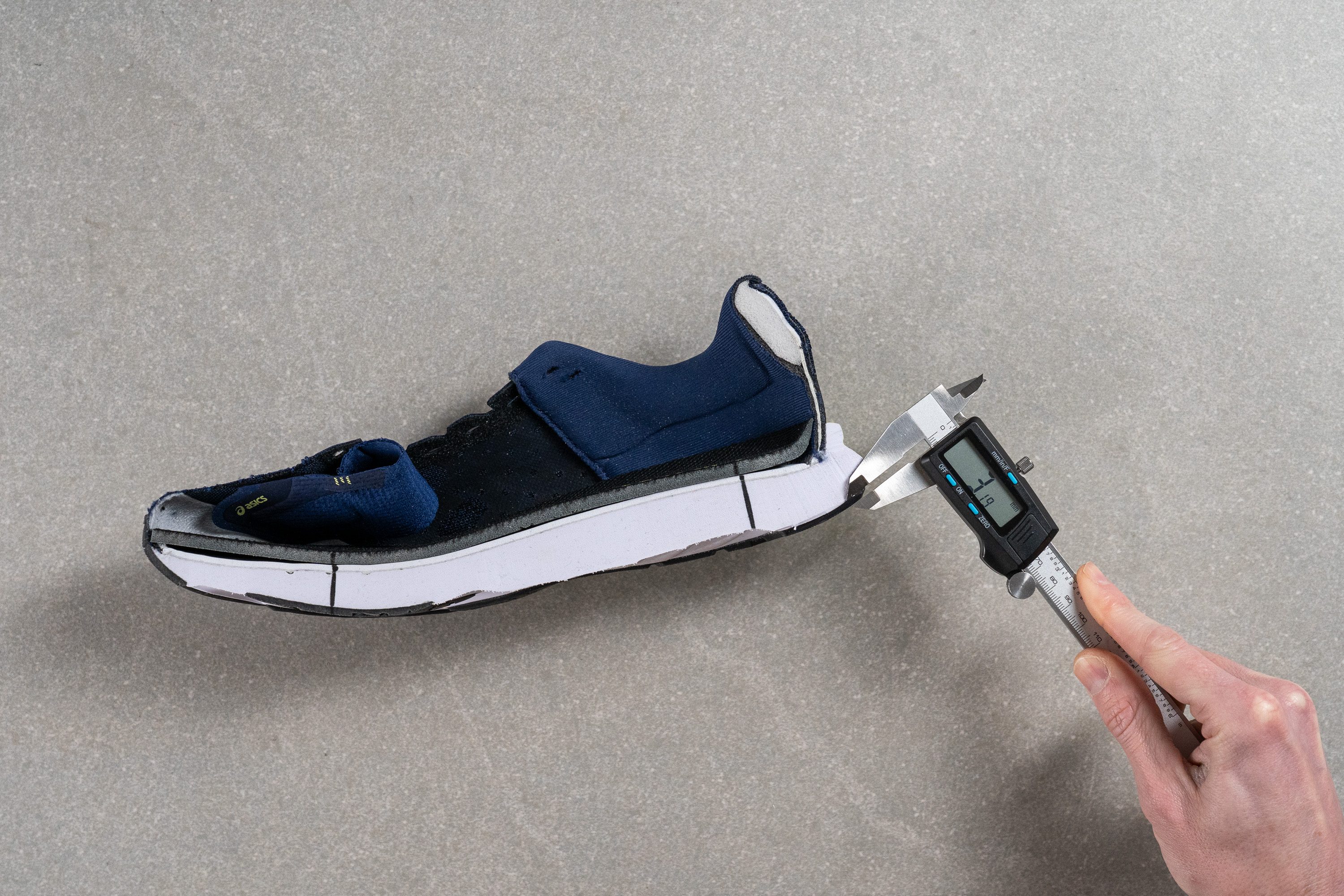
Rather than reducing the thickness of the outsole, ASICS opted to go for incomplete coverage of the outsole as well as incorporating cutouts in the exposed foam as weight-saving measures.
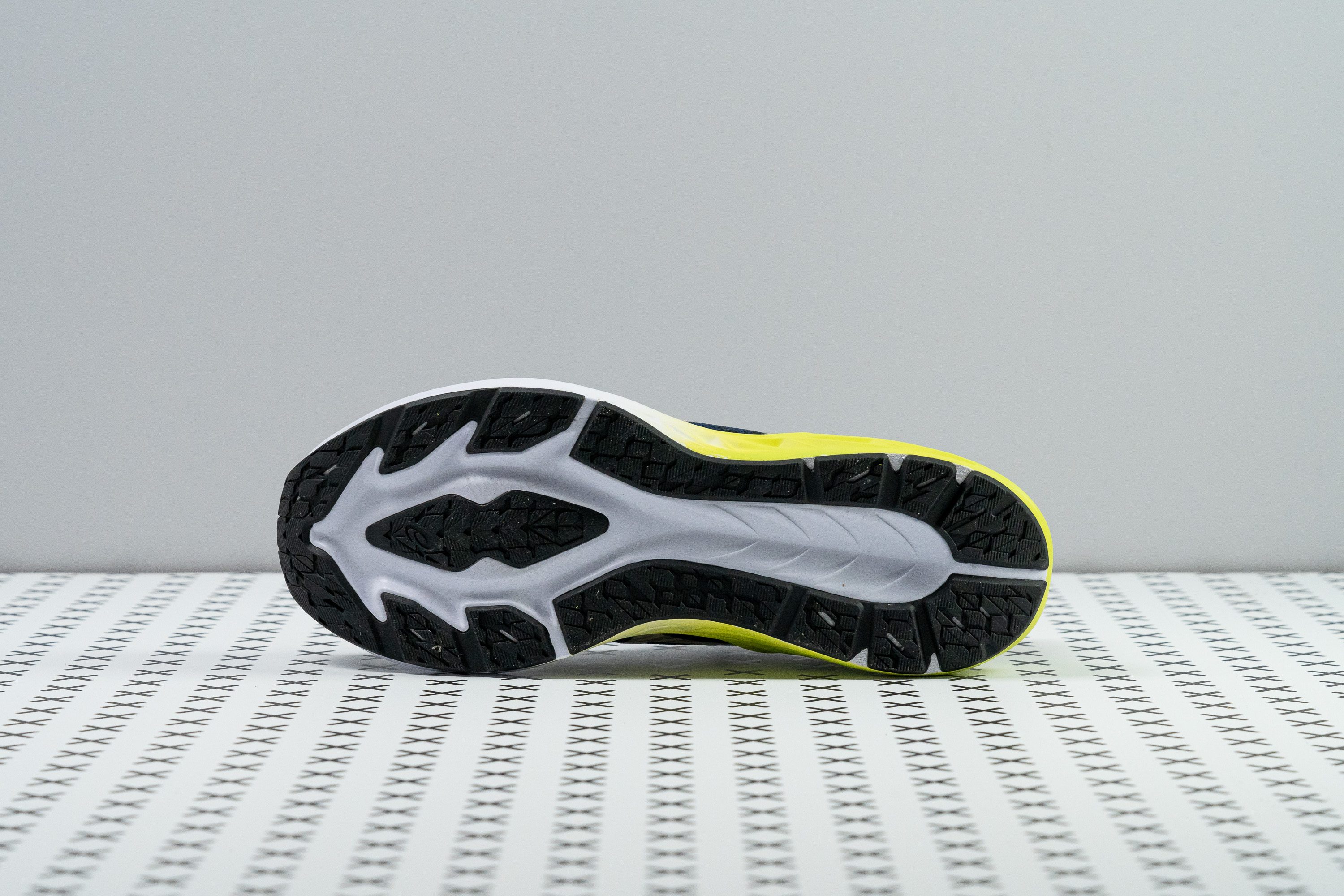
| Dynablast 3 | 3.2 mm |
| Average | 3.3 mm |
Misc
Traction / Grip
The Dynablast 3's AHARPLUS rubber outsole proved to be as grippy as it is durable when we took it out for test runs. Despite the incomplete coverage, we found that the tread provided sufficient traction on most surfaces we ran on, even when going over relatively slick cobblestones.
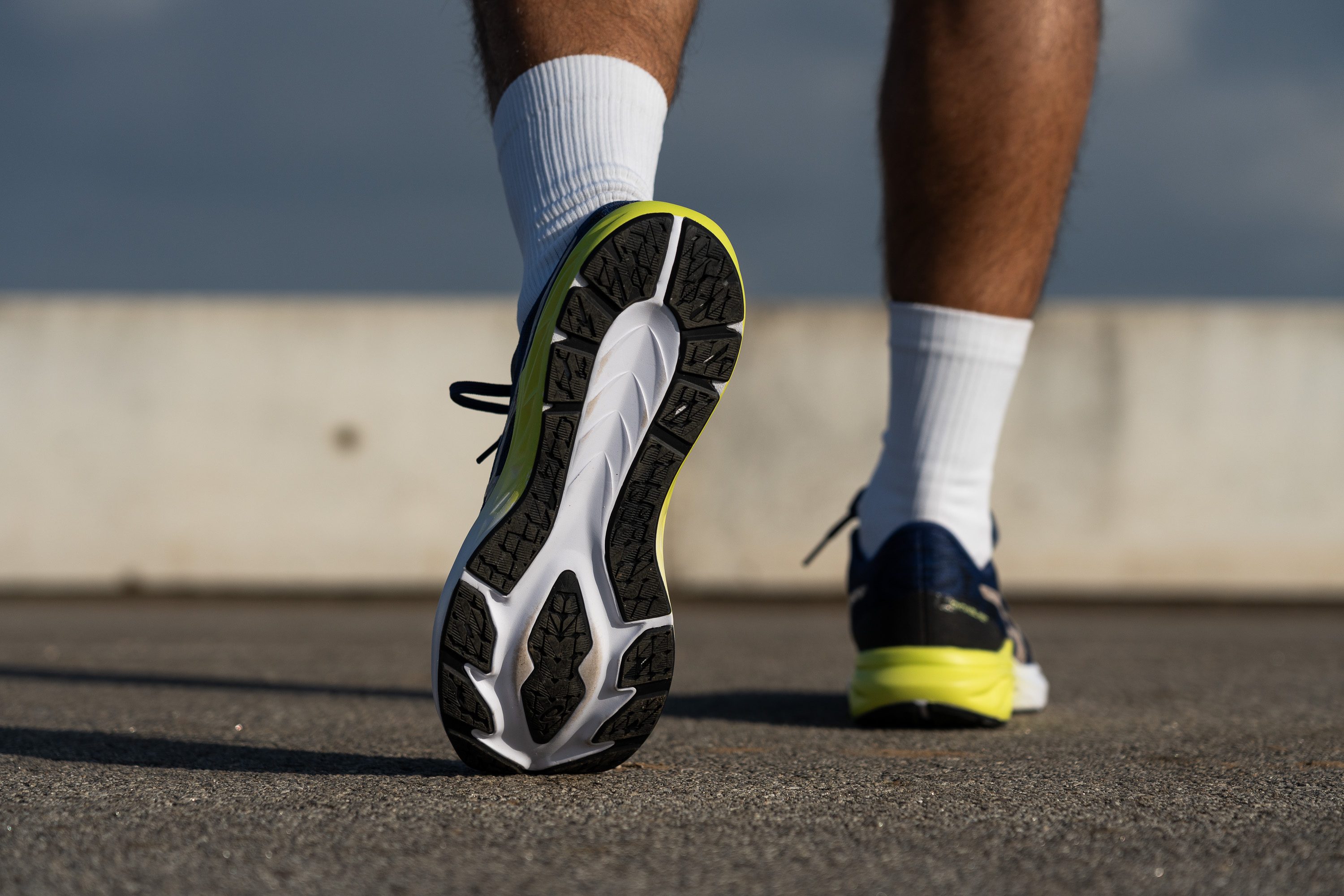
Reflective elements
We advise sticking to well-lit routes or using additional high-vis gear if running along the road at night with the Dynablast 3 as there are no reflective elements to be found on the shoe.
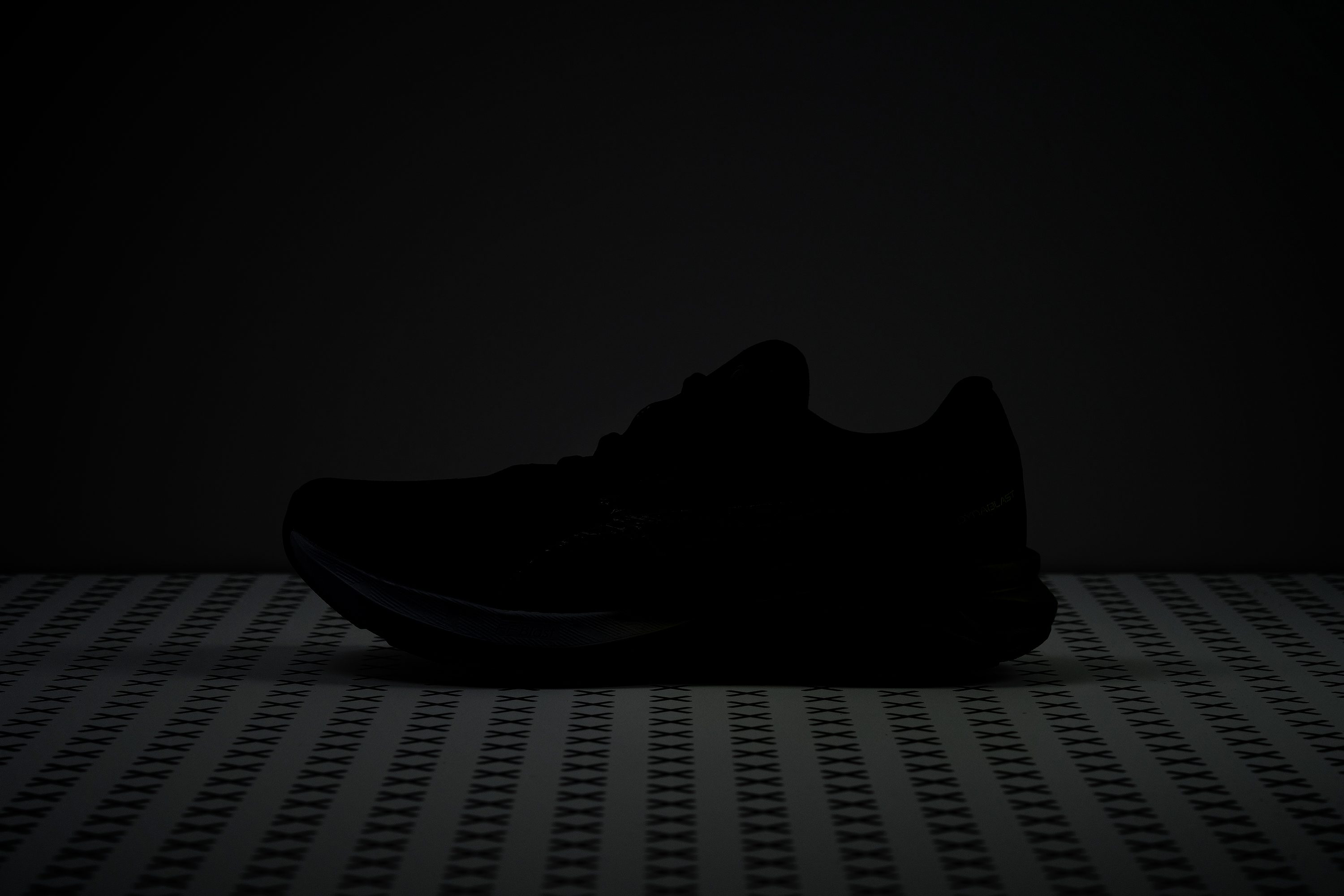
| Dynablast 3 | No |
Tongue padding
Further exacerbating the tongue's inability to stay in place is how lacking in padding it is. At only 1 mm thick, it's reminiscent of the paper-thin tongues used in race-ready shoes but rather unusual for a daily trainer. This measure also helps shave a little weight off the shoe but sacrifices comfort as the laces were annoyingly apparent across our instep during testing.
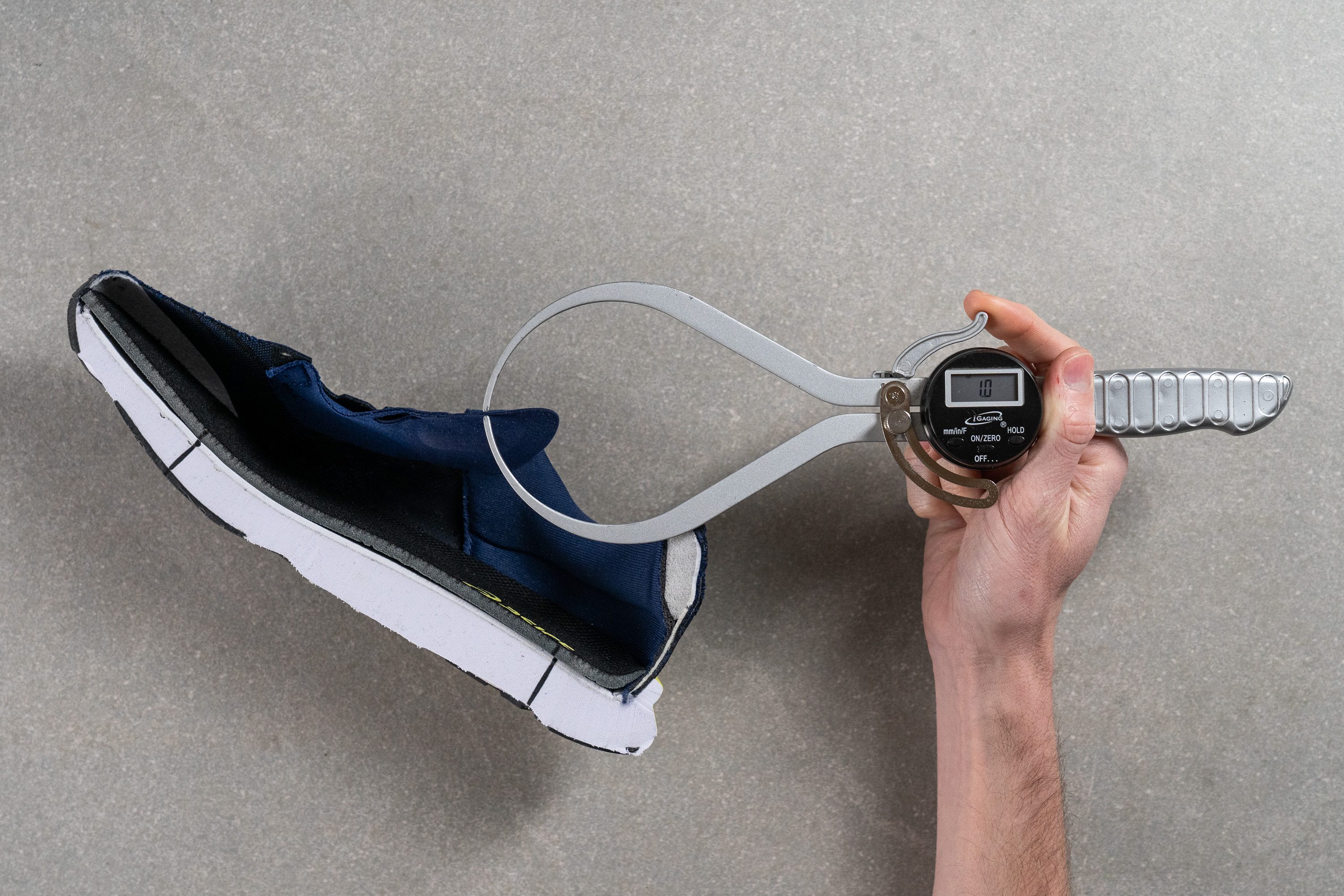
| Dynablast 3 | 1.0 mm |
| Average | 5.8 mm |
Tongue: gusset type
The Dynablast 3 features a non-gusseted tongue. While this is an effective weight-saving measure, we think this shoe would have benefitted from some form of gusset as we did experience some tongue slippage during testing.
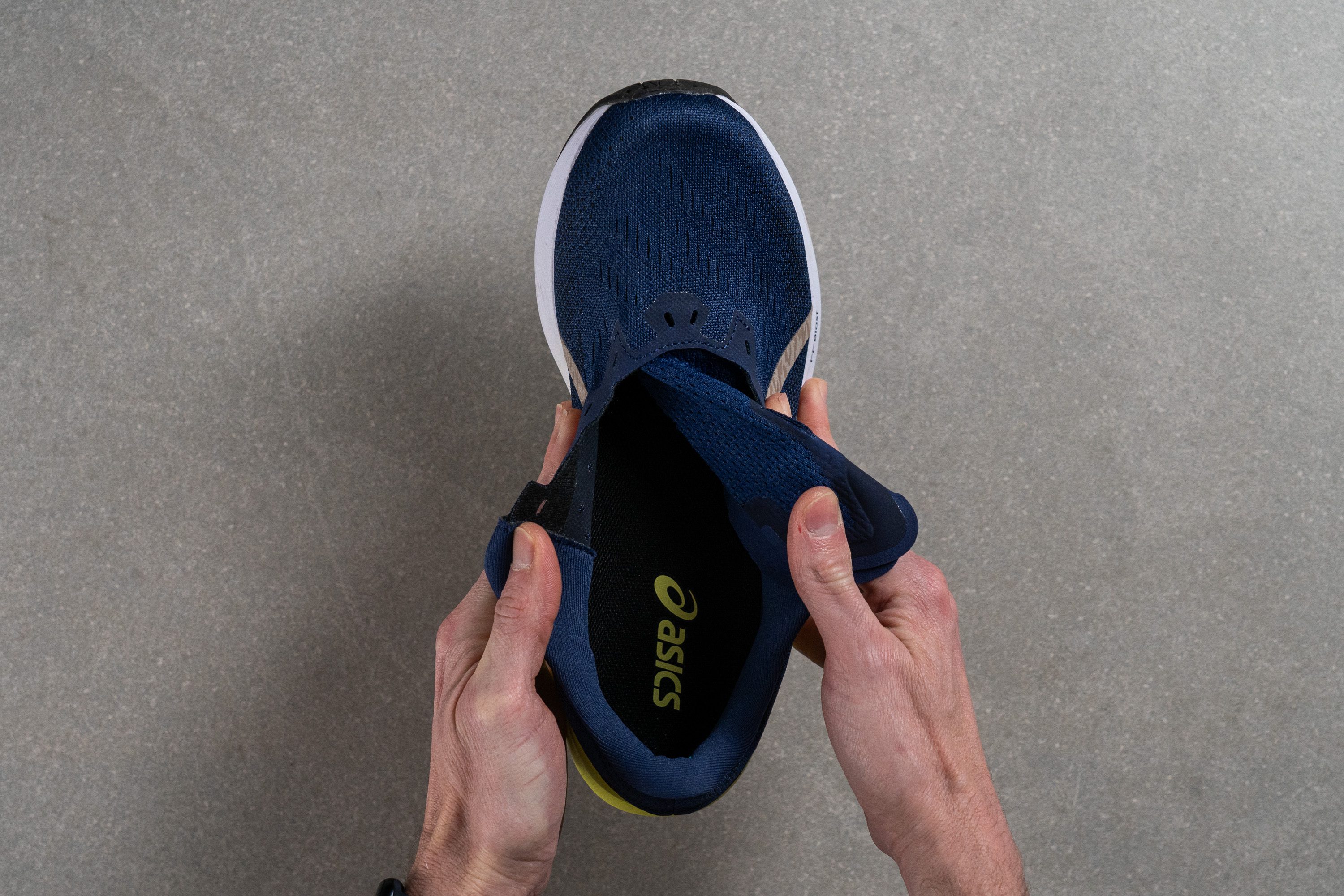
| Dynablast 3 | None |
Removable insole
The insole isn't glued in so replacing it in favor of an aftermarket alternative or a custom orthotic is possible if needed.
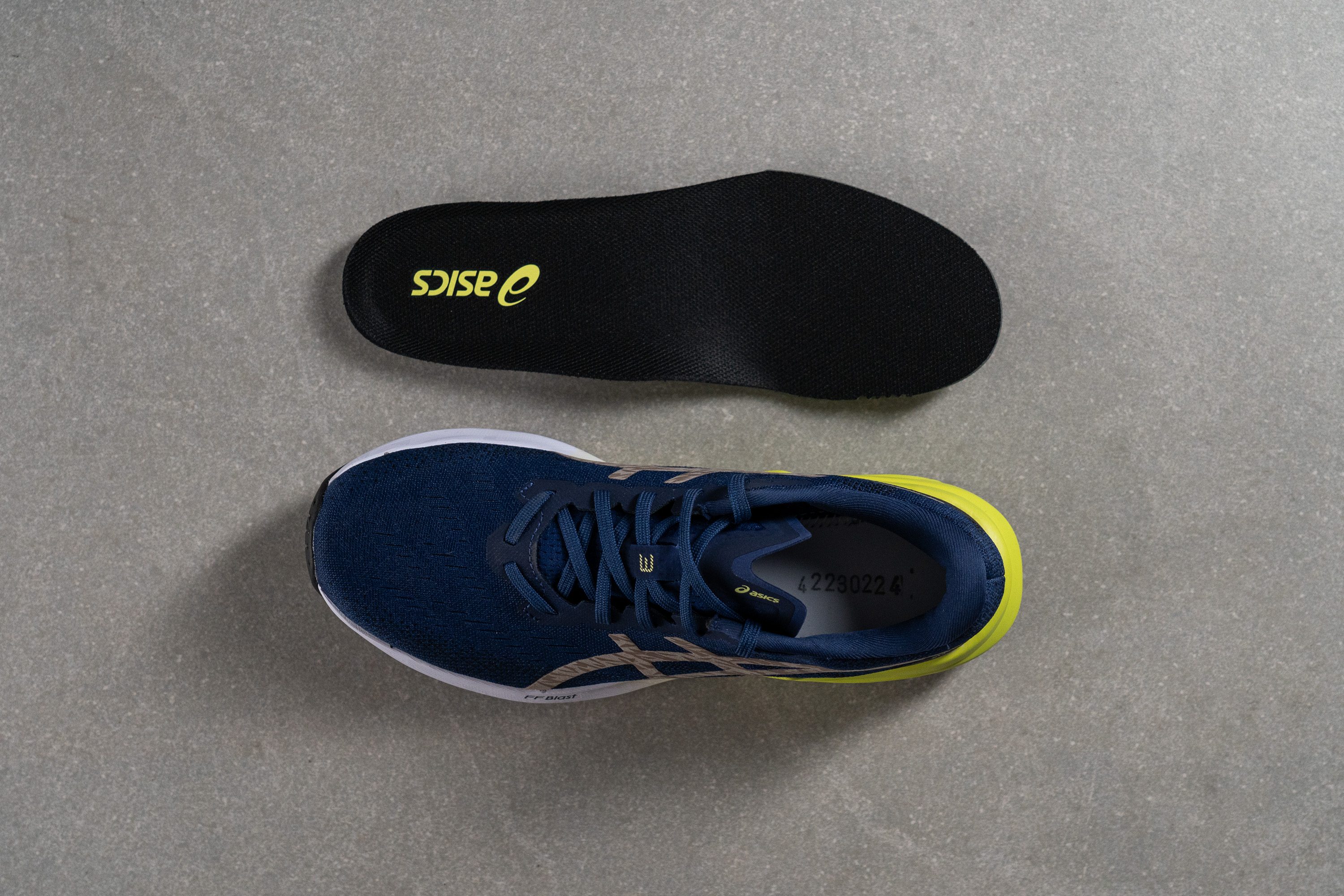
| Dynablast 3 | Yes |
 Hiring remote: Content writer / review specialist in
Hiring remote: Content writer / review specialist in 
